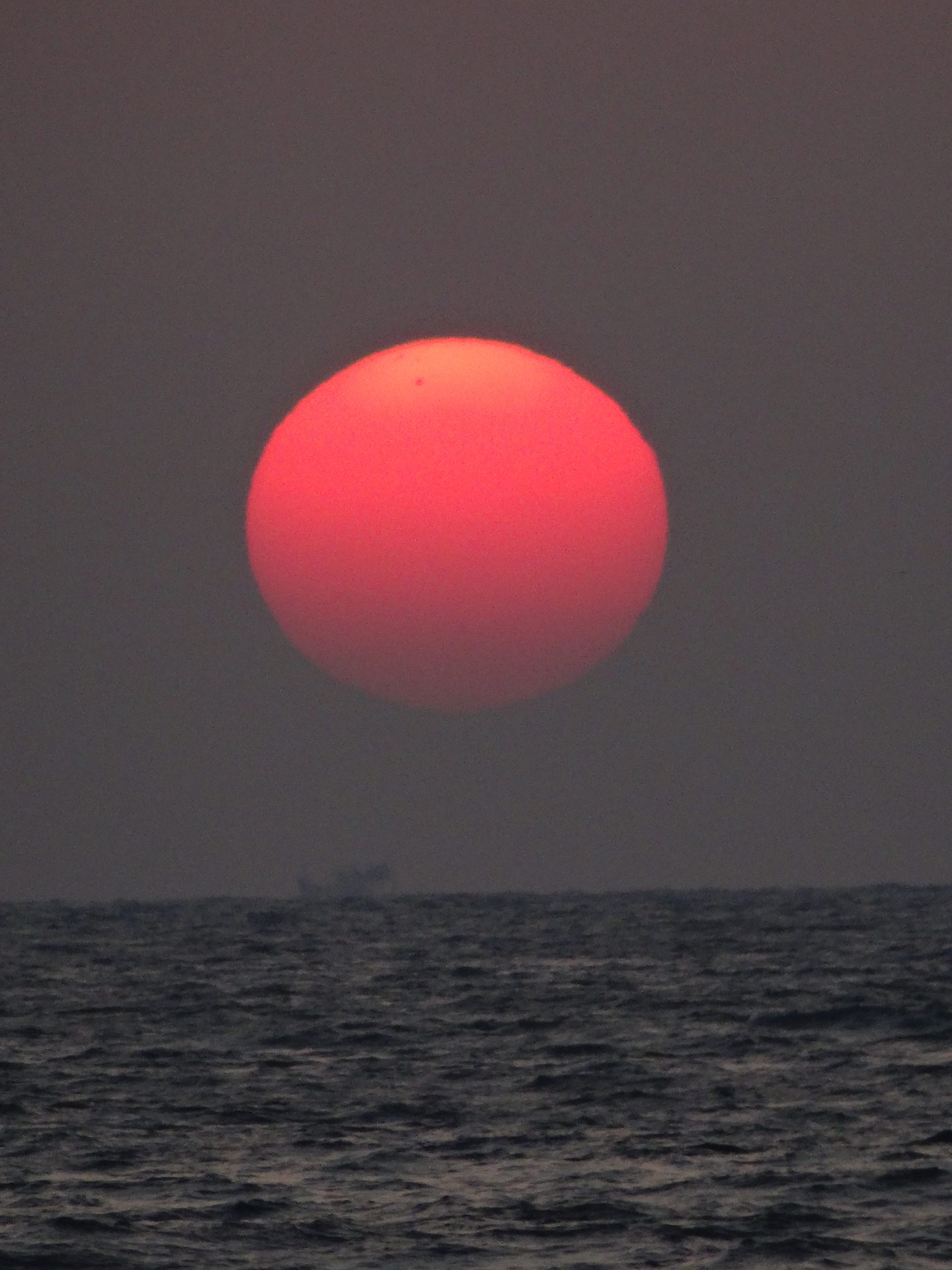We’ve booked a taxi to take us down the coast to Nirvana Beach south of the temple town of Gokarna. It’s reputed to be less developed, more remote and less exploited than Goa. It’s certainly more remote because our taxi driver doesn’t know where it is, has never been there and can’t find it. He thinks it’s near Gorkana, which it is if you’re on foot with access to it across an estuary on a passenger ferry. But by car it’s a big loop round the estuary.
Nirvana beach is a beautiful 7 km stretch of almost deserted sandy beach discretely backed by a few small hotels hidden in plantations of palms and deciduous trees. Jo has booked, for five nights, a cottage in the plantation with a veranda overlooking the ocean at Ombodhi Retreat near the small coastal village of Kumta. It’s very nice indeed. It’s the third week of March so it’s beginning to get very hot during the day (38C+). I don’t sunbathe with the same fervour as Jo, so make good use of the hammocks under the trees and recliners in the shade, beyond the wooden gate, on the beach. Other than a group of six Russian women on a yoga retreat and a couple of Spaniards, all our fellow guests are from India.
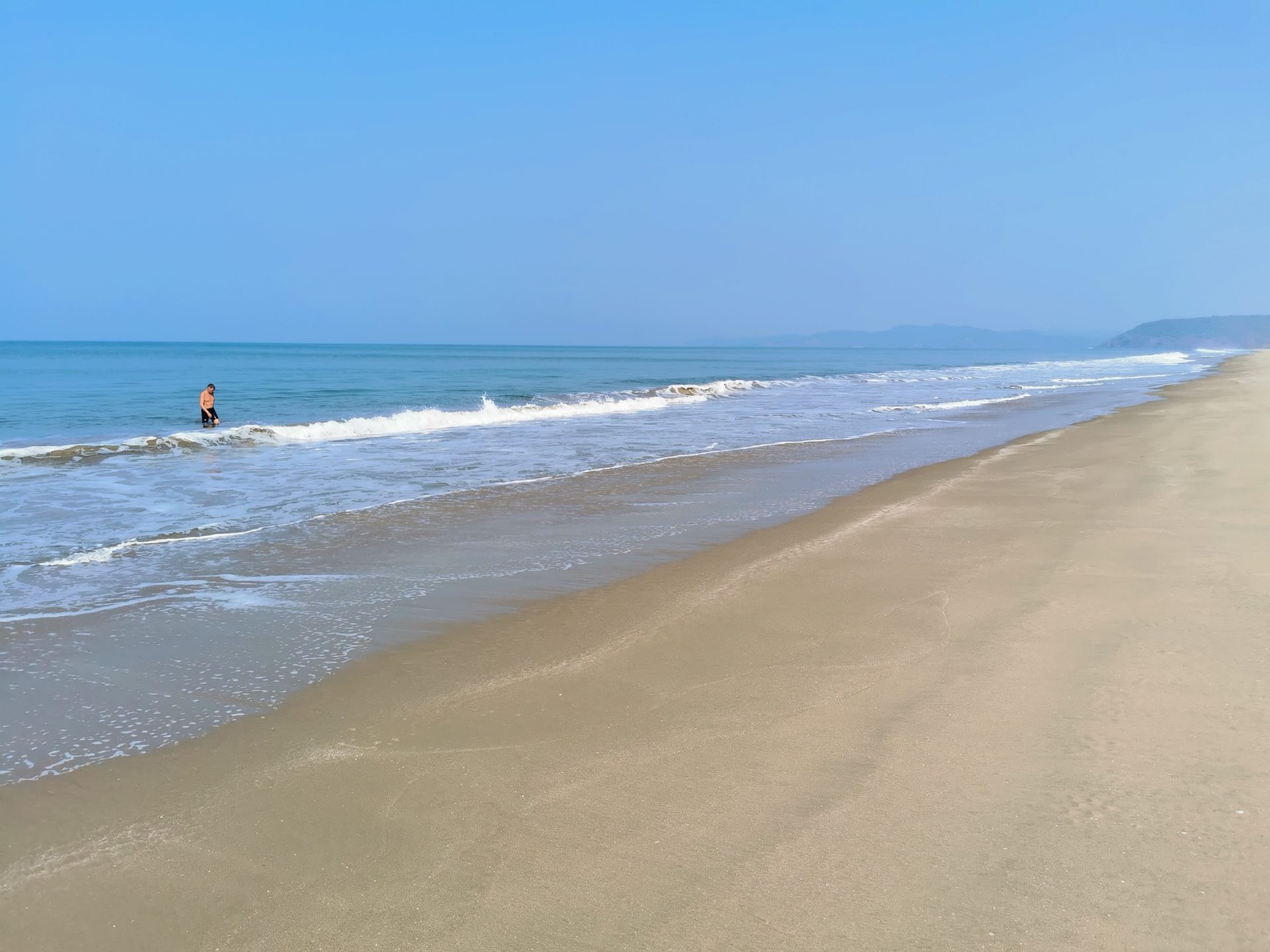
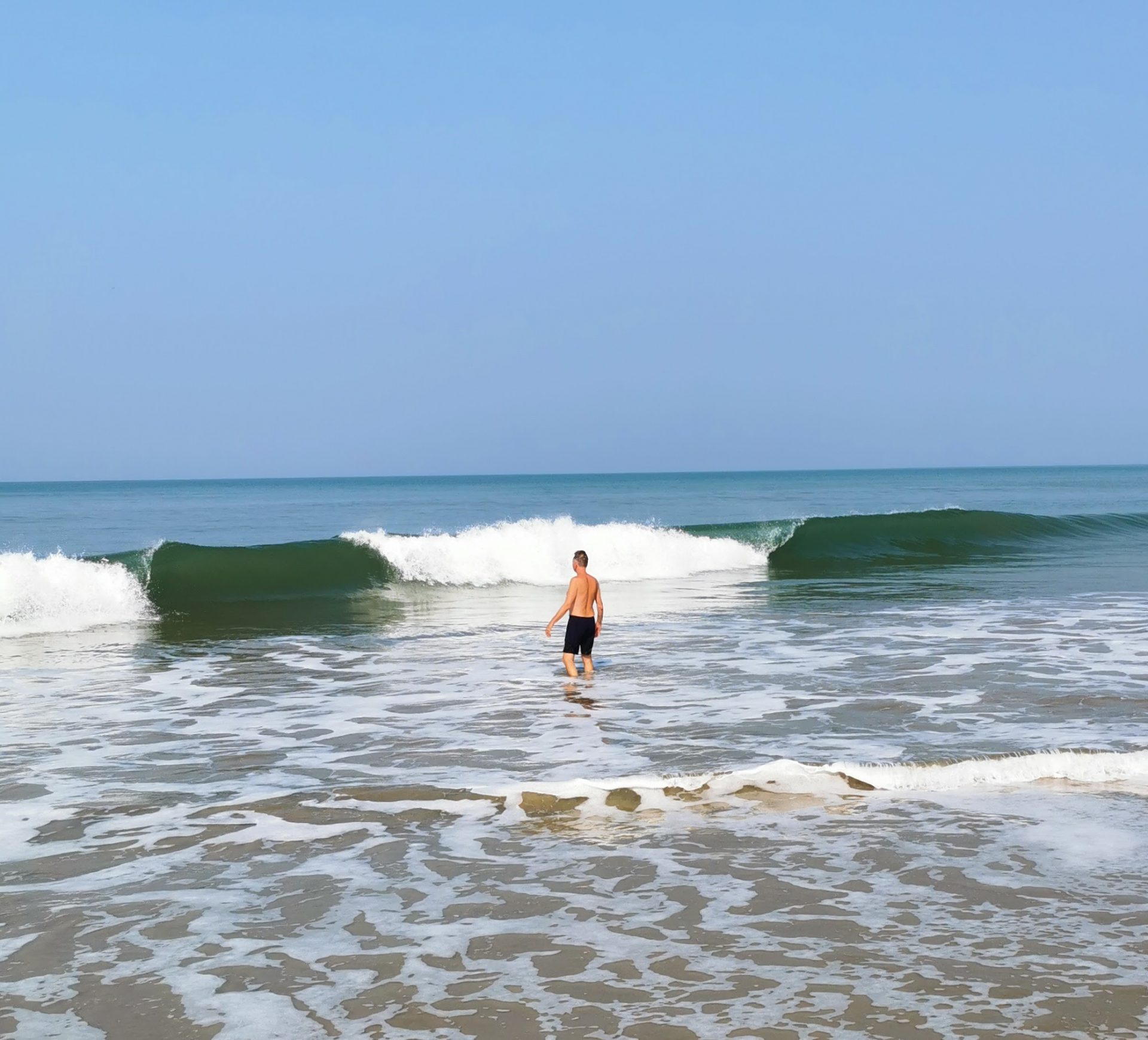
This morning Jo returned from an early morning jog down the beach where she came across a dead dolphin. She showed me a photograph. It looked like an adult with no obvious injuries. I discovered that it’s a rare humpback dolphin which lives in inshore waters and is threatened by all sorts of human activity and pollution. There are lots of fishing boats along this coast, the number of which only becomes evident when you see their hundreds of navigation lights at night. This afternoon I’m sitting in the shade with my binoculars. I’ve just seen a lovely bird; a glossy black Asain Koel with a long tail, then I spot a small pod of maybe six humpback dolphins, a couple of hundred metres offshore. They’re very active – one leaping clear out of the ocean. I despair for their future.
Nirvana beach is mostly deserted and I enjoy swimming through the big breakers into slightly calmer waters. Jo has been on another jog, this time up the beach. She invariably comes across something interesting and tells me there’s a small fishing community up there, folks living in simple shacks just behind the sand. ‘Look what I discovered.’ she says holding up her phone. On it is an image of piles of faeces on the sand between the high and low water marks. ‘I ran past a guy squatting and defecating. He was on his phone. He smiled and waved to me.’ she says. We conclude that this practice has probably been going on for generations and that there’s no incentive for it to change. For me, the lure of a swim in the ocean has taken a bit of a knock.
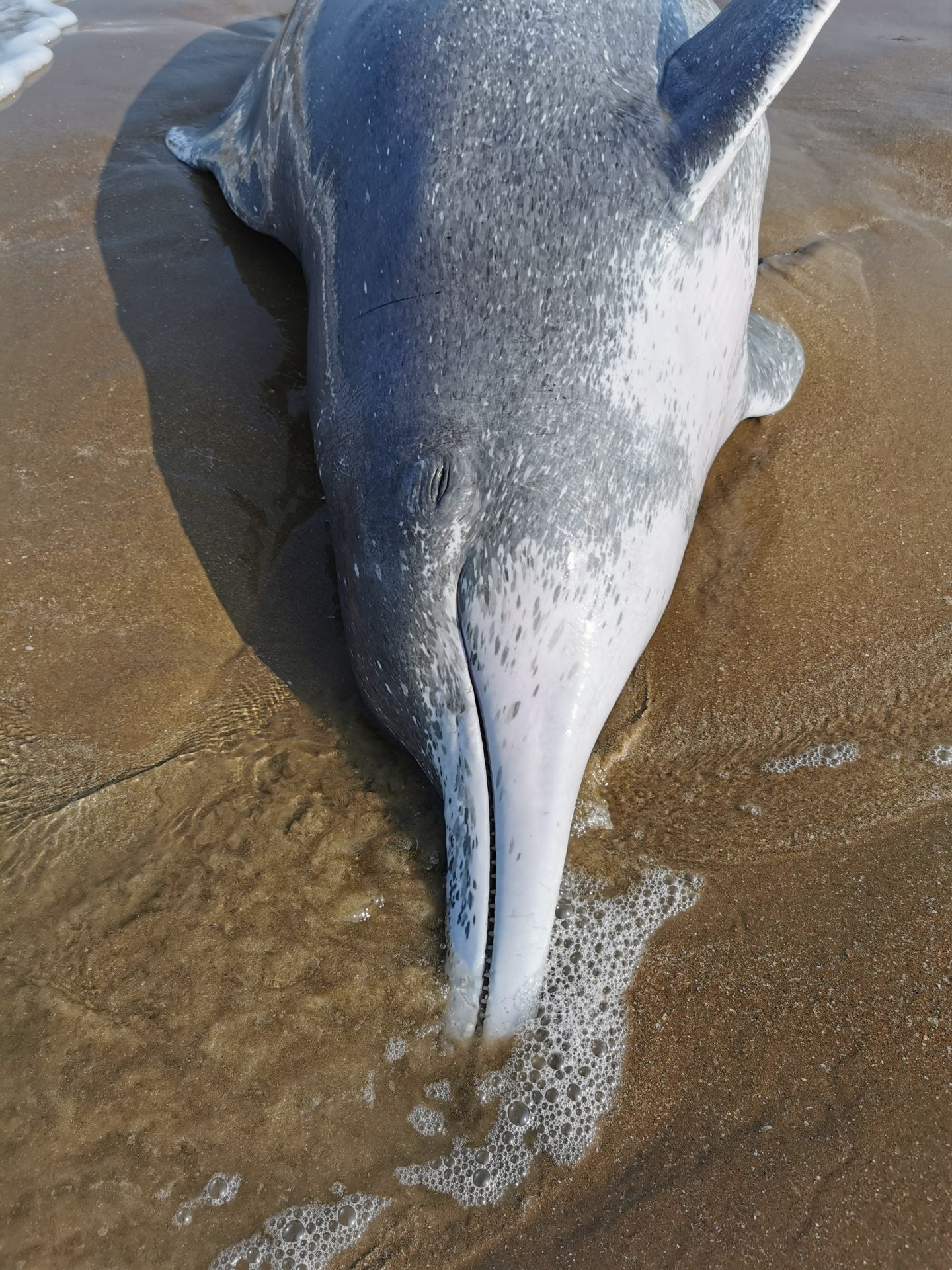
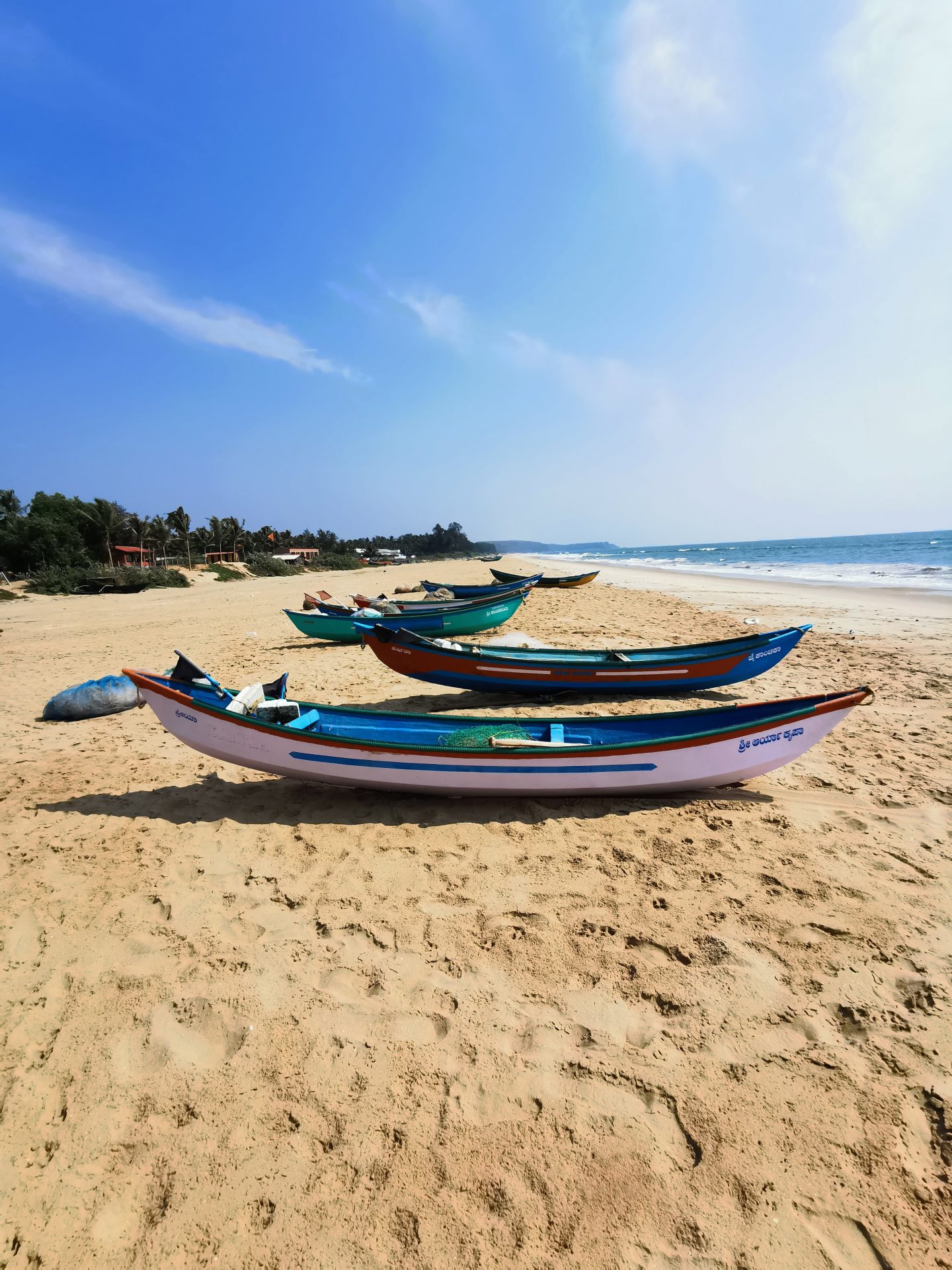
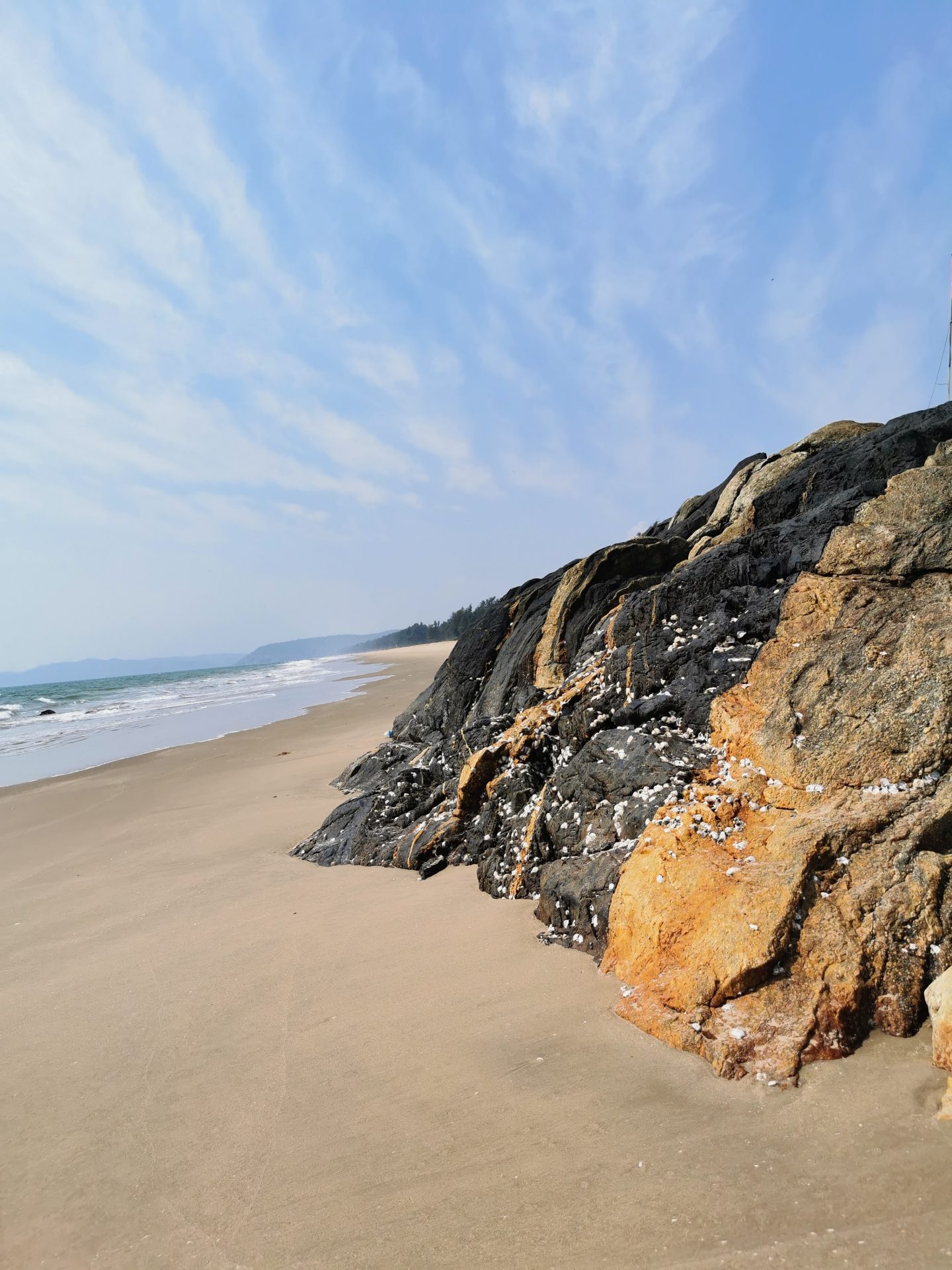
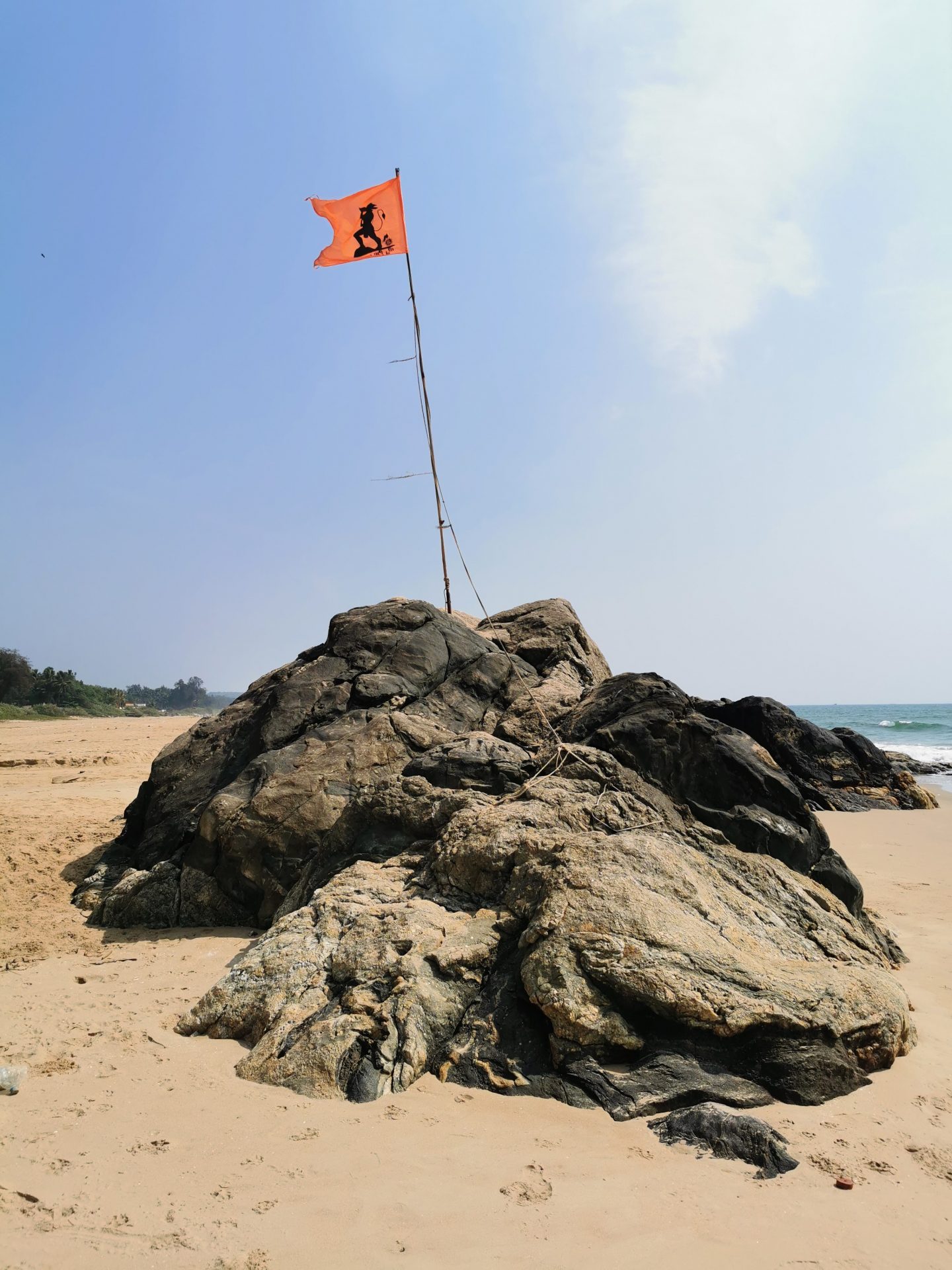
We travel for ninety minutes by rickshaw, ferry and rickshaw again to visit the famous Gorkana beaches of Om and Kudle, both of which are very quiet. Om with its semicircular volcanic beaches has a particularly attractive setting. A lot of beach restaurants are closed but the popular boat rides are still running. Unfortunately there is the usual trash scattered about and piled amongst the rocks. We don’t linger for long. We walk to Kudle beach which, from the head of the cliff looks lovely but once again, on closer inspection it’s filthy. We stop for breakfast at a beach restaurant with comfortable seats and a decent looking menu. But very little is available. These Gokarna beaches are touted as being more laid back and less commercial than those in Goa, which they are, but they’re spoiled by human detritus. By comparison with these places, the remote Nirvana beach where we’re staying is wonderful.
We take a rickshaw to Gokarna town, an important pilgrimage destination for Hindus. On the main street are lovely ornate wooden dwellings and temples, reminding me of Kathmandu, and a couple of giant wooden chariots which are pulled through the streets during the annual Shivaratri festival. There are plenty of shops. We want to dispose of a small number of books but the bookstore is closed so we do what we seldom do and buy stuff: T-shirts, spices, and a small decorated steel tongue drum. Jo has been haggling for most purchases for weeks now and her much used, favourite closing line is ‘I’m happy if you’re happy.’
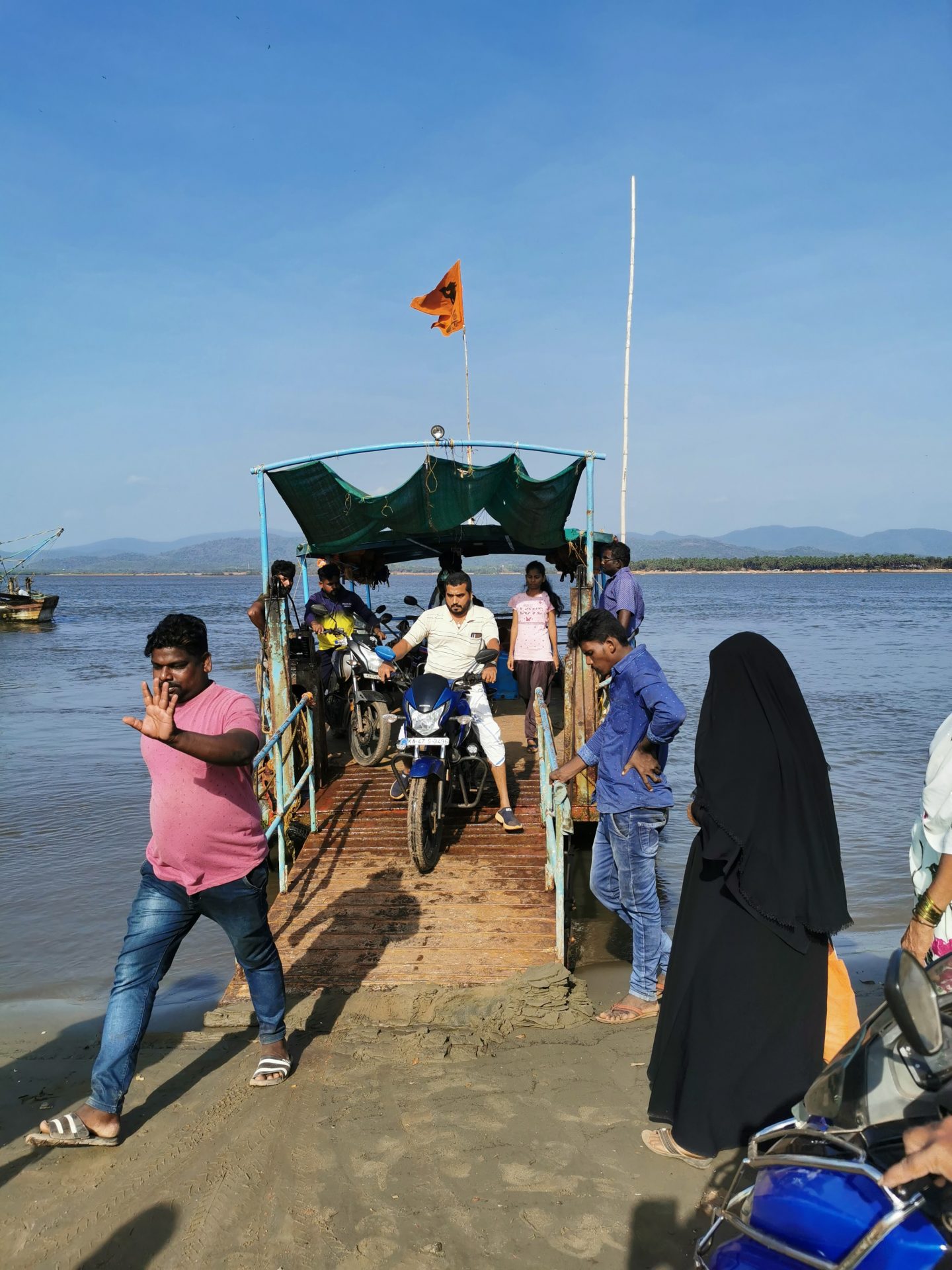
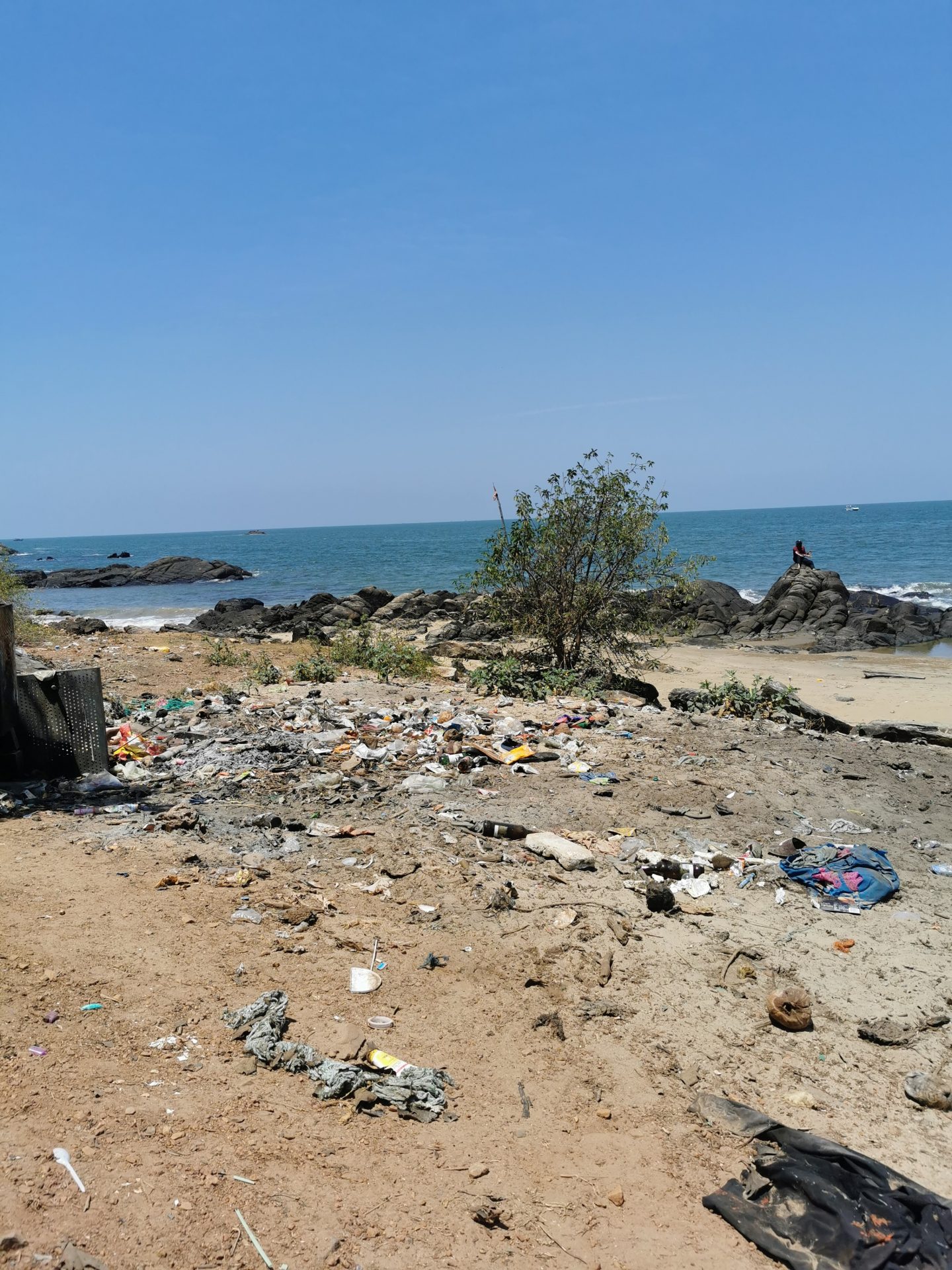
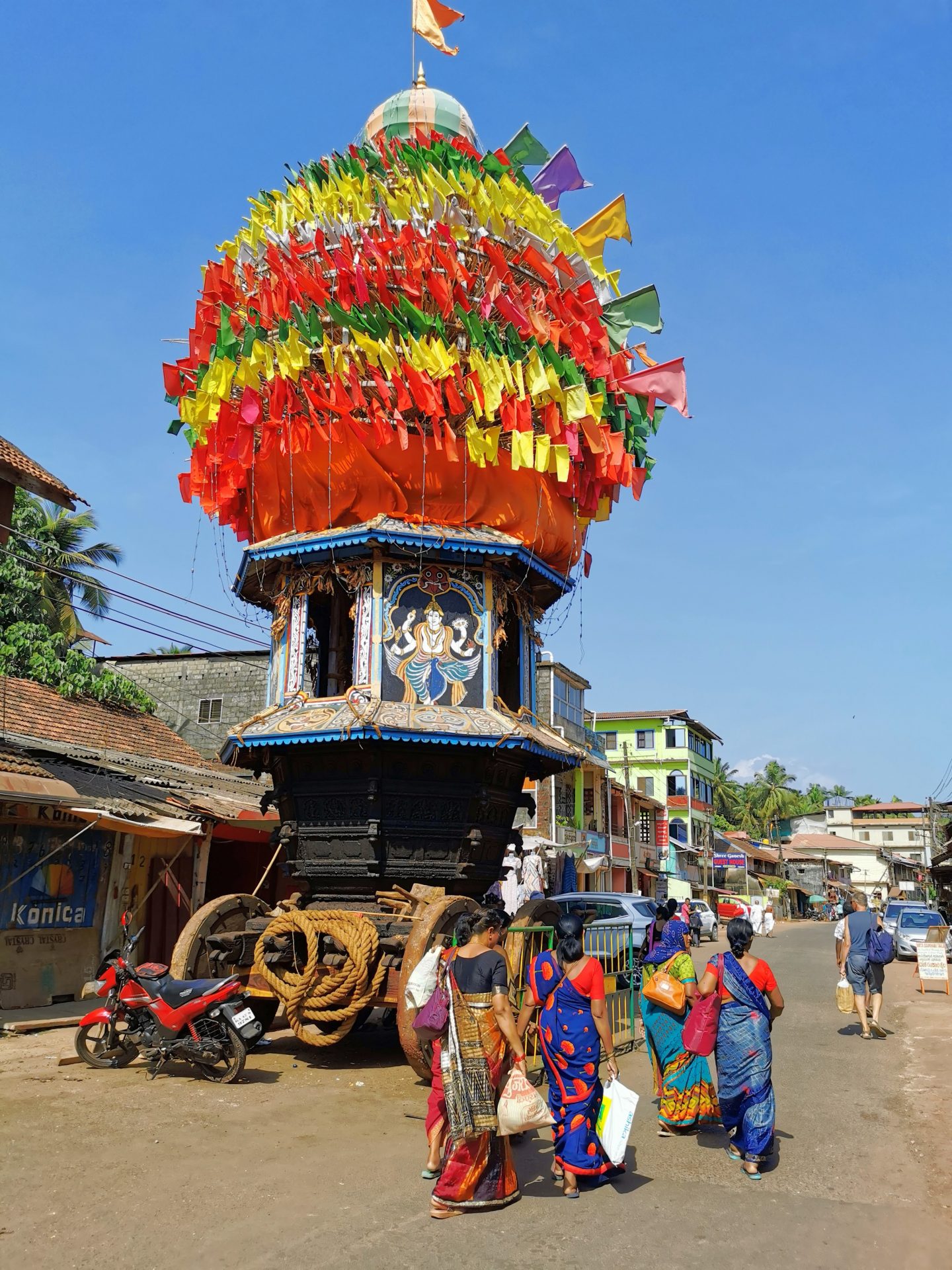
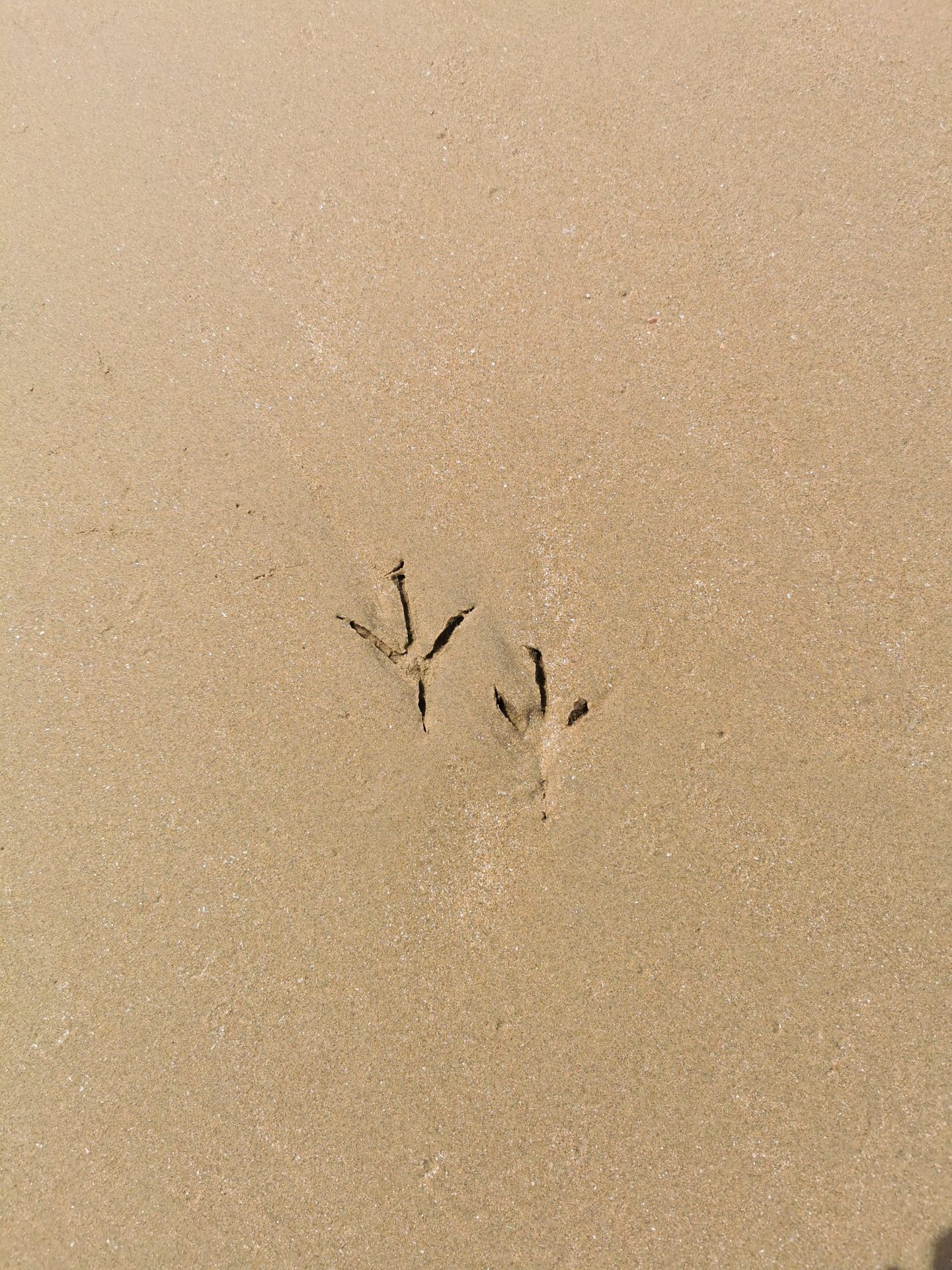
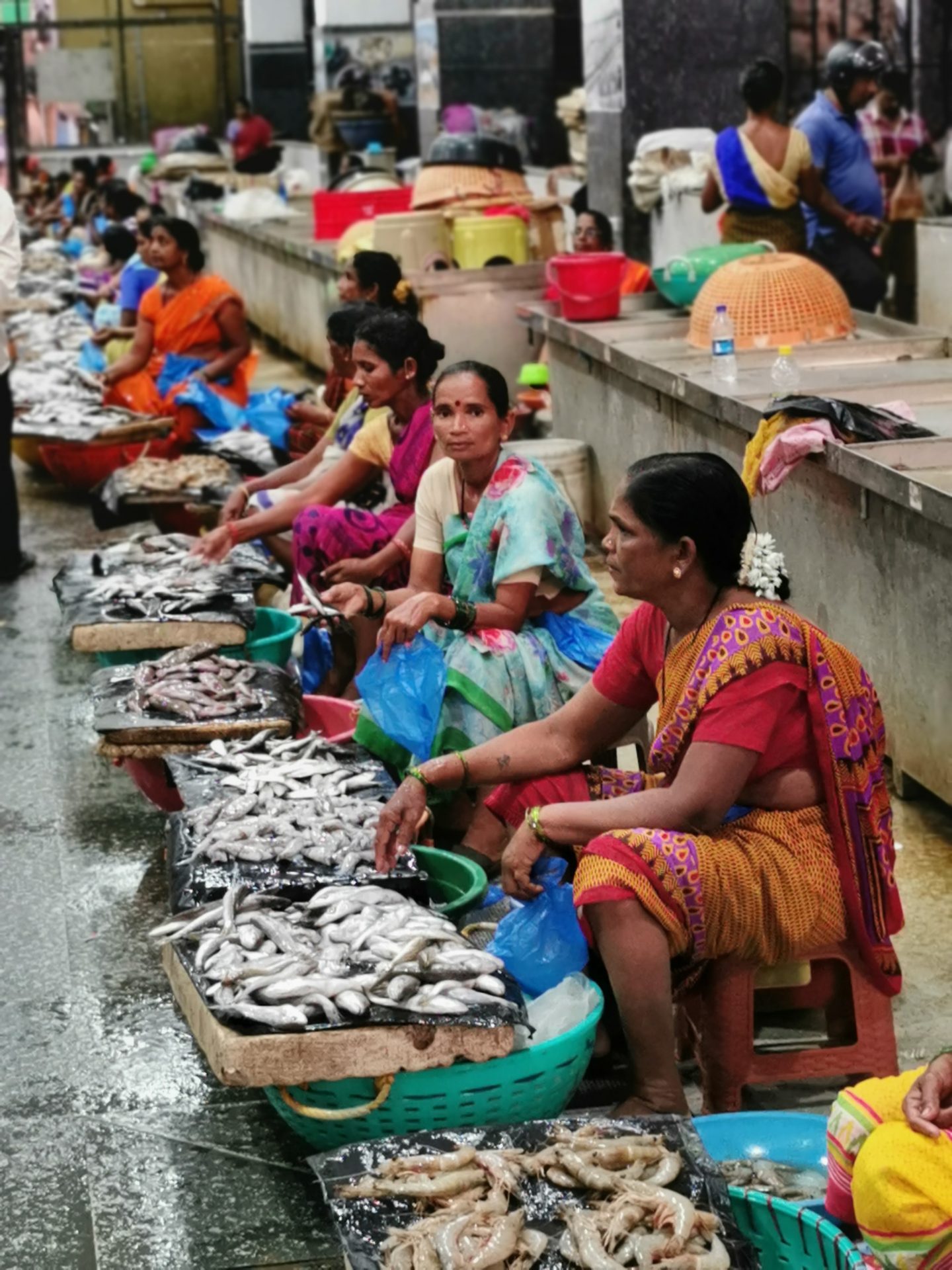
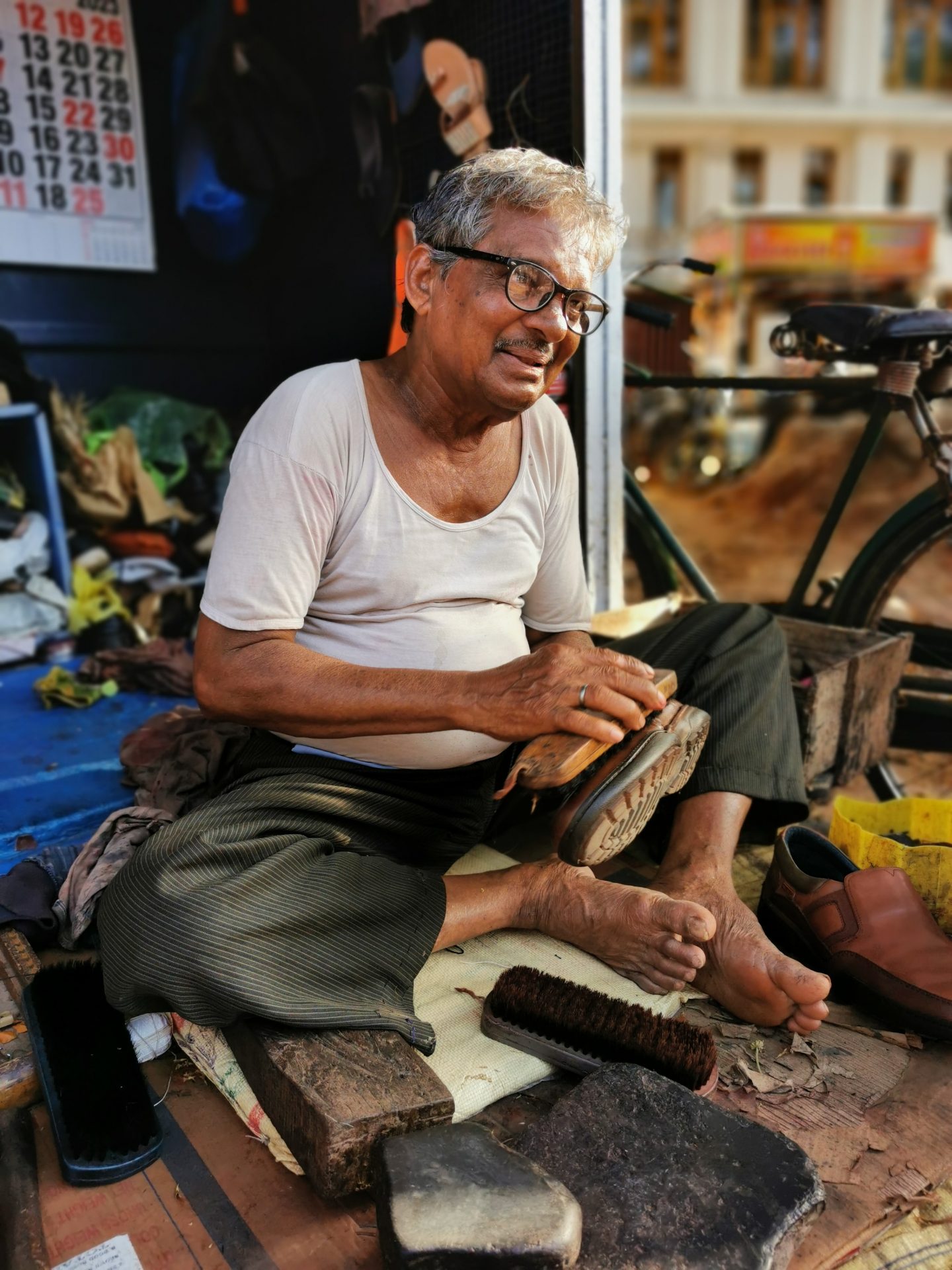
It’s 8am and we’re in our 1st class sleeping compartment for the 875km, twelve hour train ride from Karwar to Alleppey, back near to where we started over two months ago. There are four bunks in here and we have the lower two. The top two are empty. There are clean sheets and blankets, a mousetrap, a cockroach and two bottles of water. It’s very comfortable. We didn’t get much sleep in our downtown hotel in Karwar last night as it was Hindu New Year and the music, drums and fireworks went on into the early hours. Breakfast is served shortly after the train departs. We play a few games of backgammon then I doze on my bunk wearing headphones listening to a three hour playlist of 1970s psychedelic rock music including the likes of Soft Machine, Hatfield & The North, Gong, Neu, Pink Floyd. It’s all very eclectic and a great accompaniment to the somnolent rolling and occasional jolting of the carriage. We’re joined for a few hours by a mother and her mumbling toddler, but I’m oblivious to them until the cheerful steward arrives with curry for lunch. We play a few more games of backgammon – Jo curses my good fortune as I roll double after double on the dice. I have a glass of 8PM and coke. We watch the estuaries and rivers of the Kerala backwaters in the late afternoon sun. This is a delightful train ride.
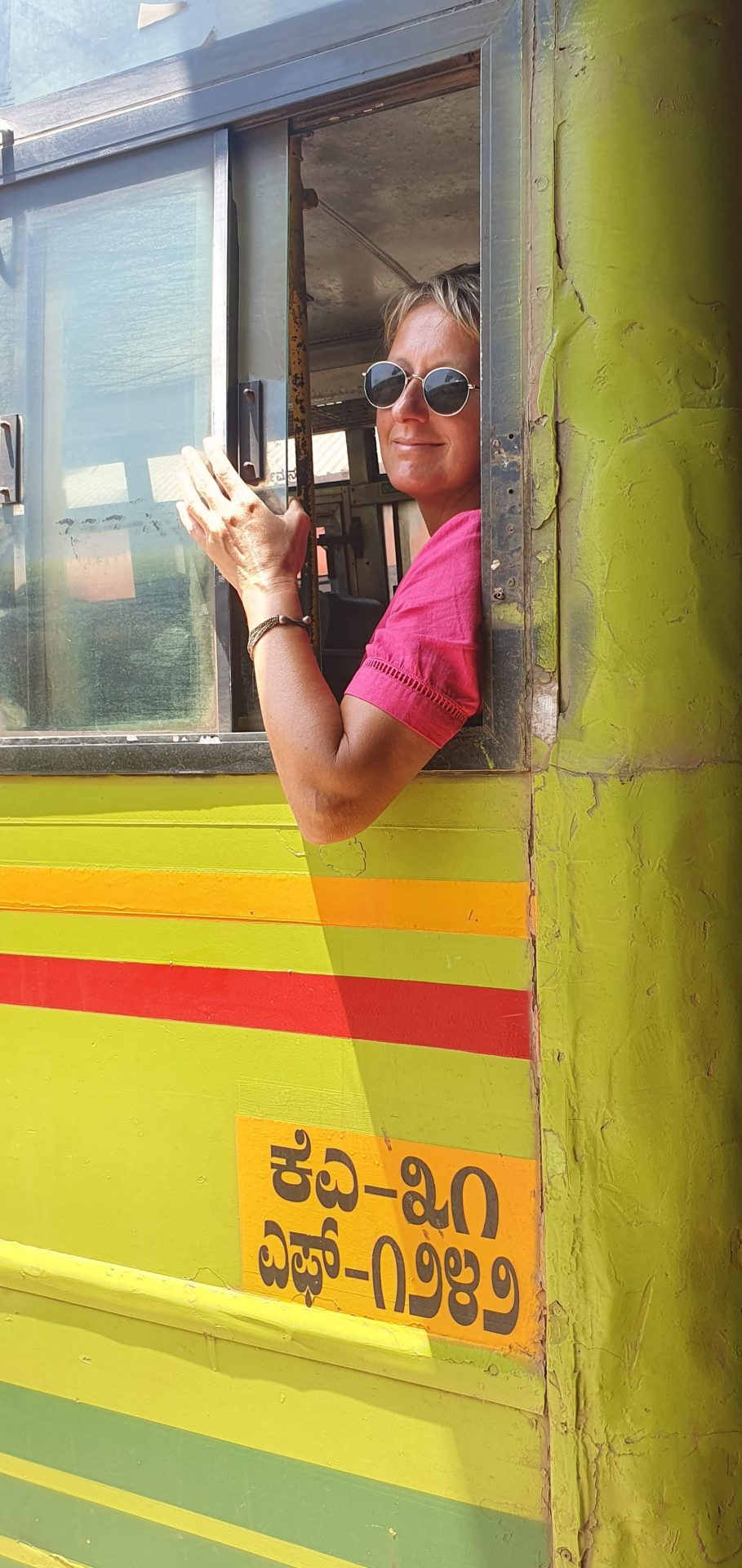
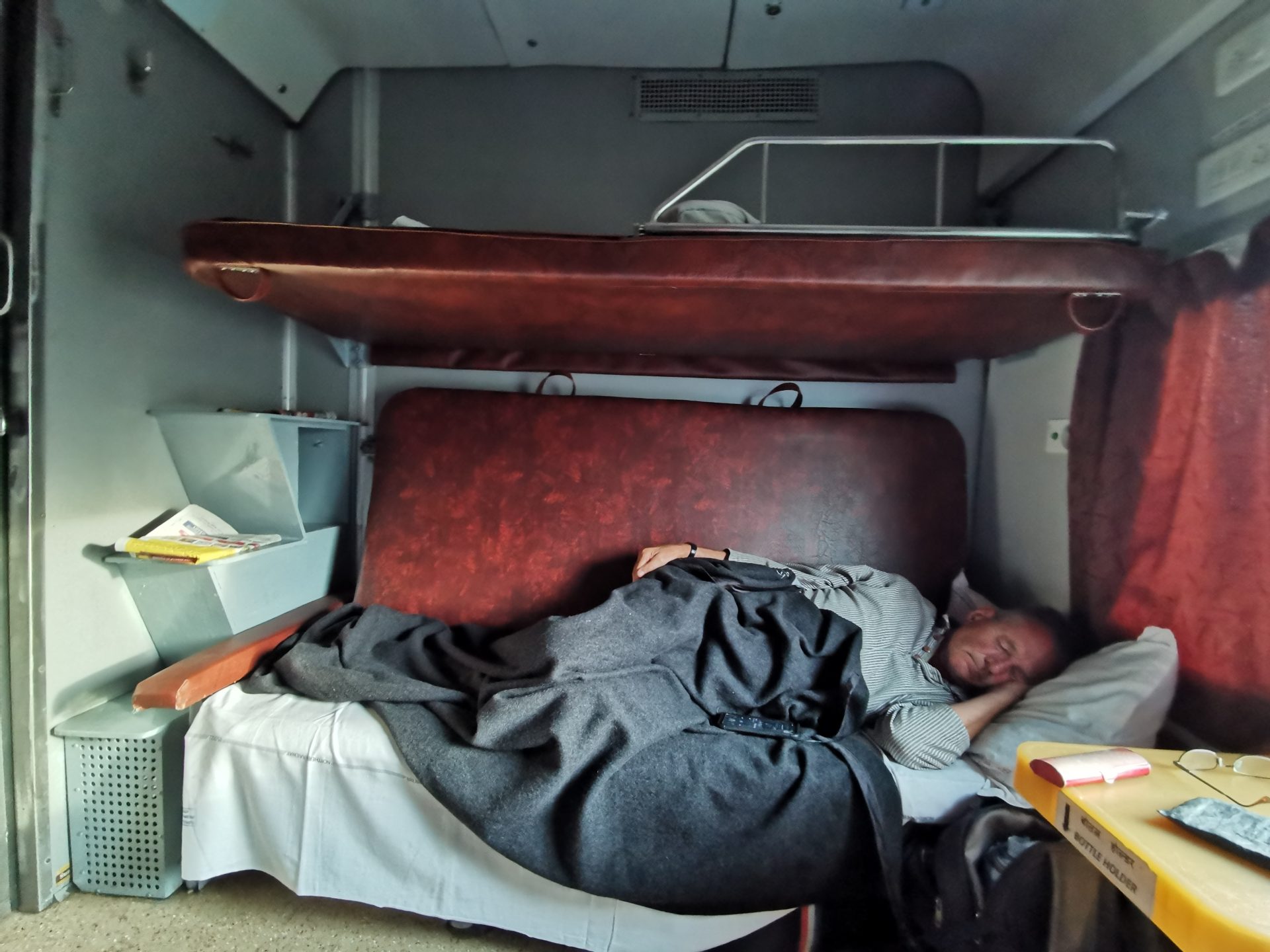
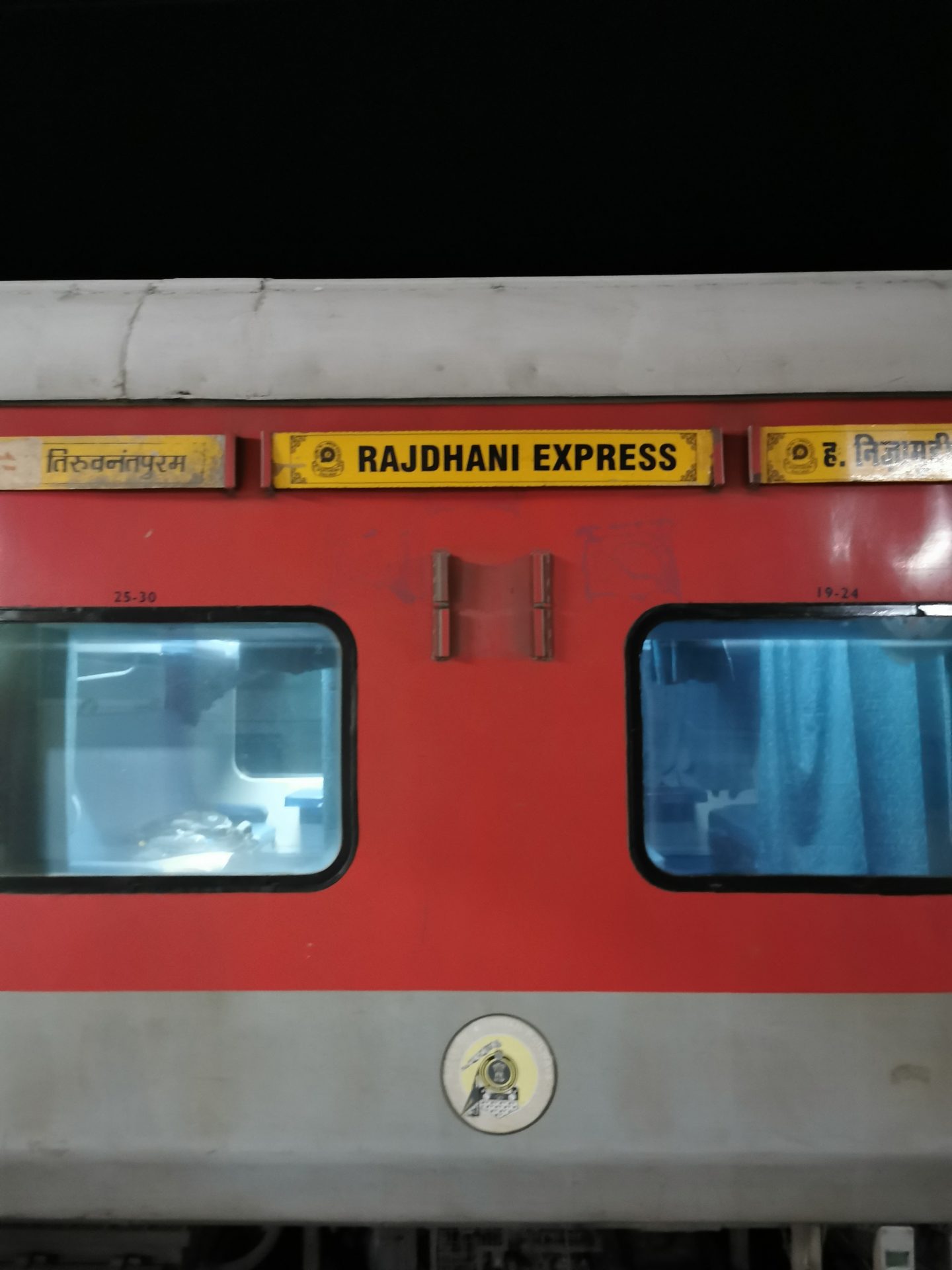
We’re approaching Ernakulam Junction. This is where I left my jacket on a bench on the platform two months ago. I ask our steward how long we will stop in Ernakulam. He says three minutes. I’m wondering if they have a lost property office. I say to Jo, ‘The steward says we’re going to stop in Ernakulam for five minutes. I could try to find my jacket.’ She looks at me sceptically, ‘Bye Armand,’ she says, ‘see you tomorrow in Alleppey.’ She’s right of course and I’m only being mischievous. The train stops at Ernakulam, I jump off, stretch my legs and look at the assortment of offices; ticket, station master, ladies’ waiting room, but no lost property. I board the train which actually stops here for ten minutes.
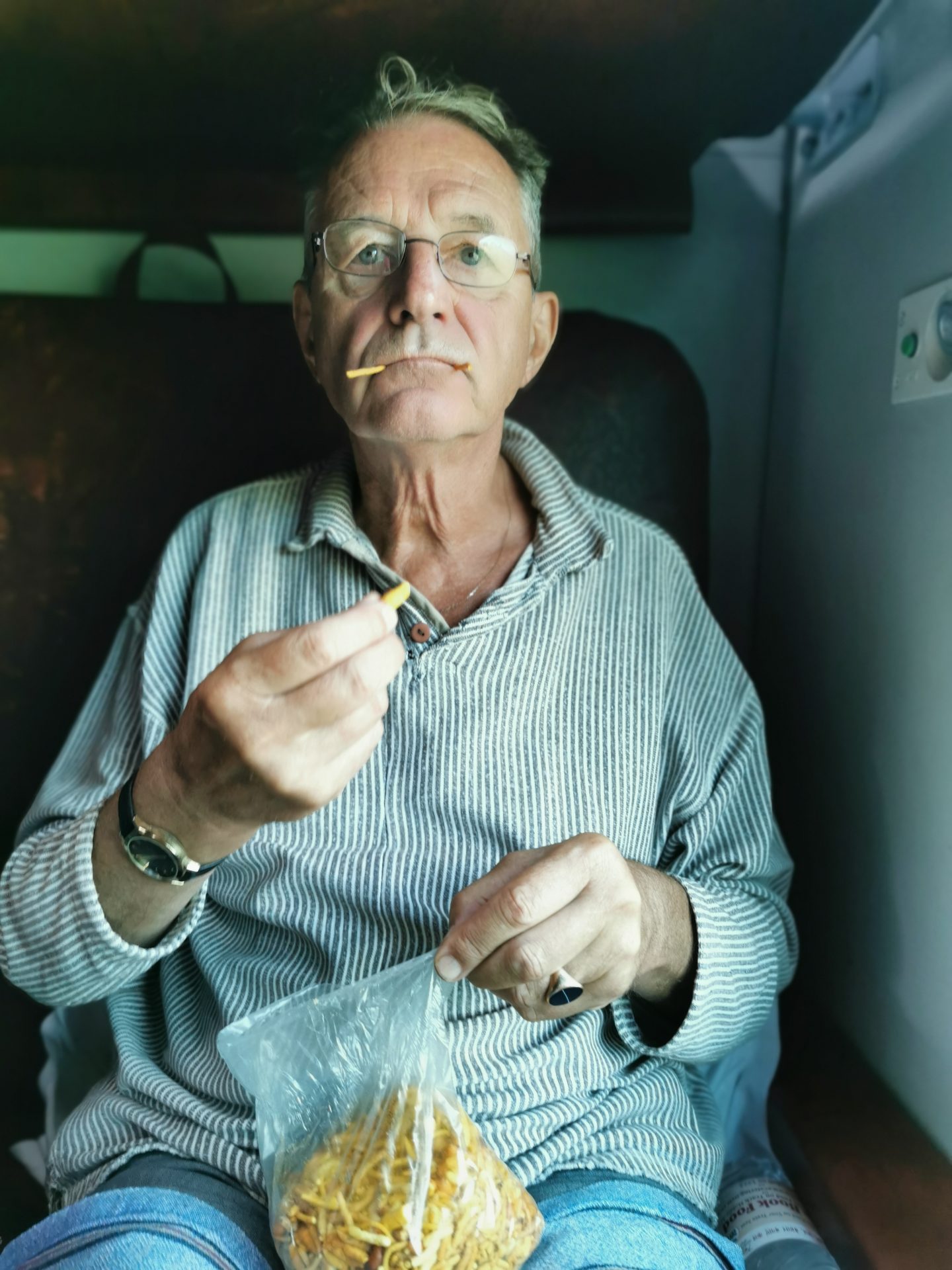
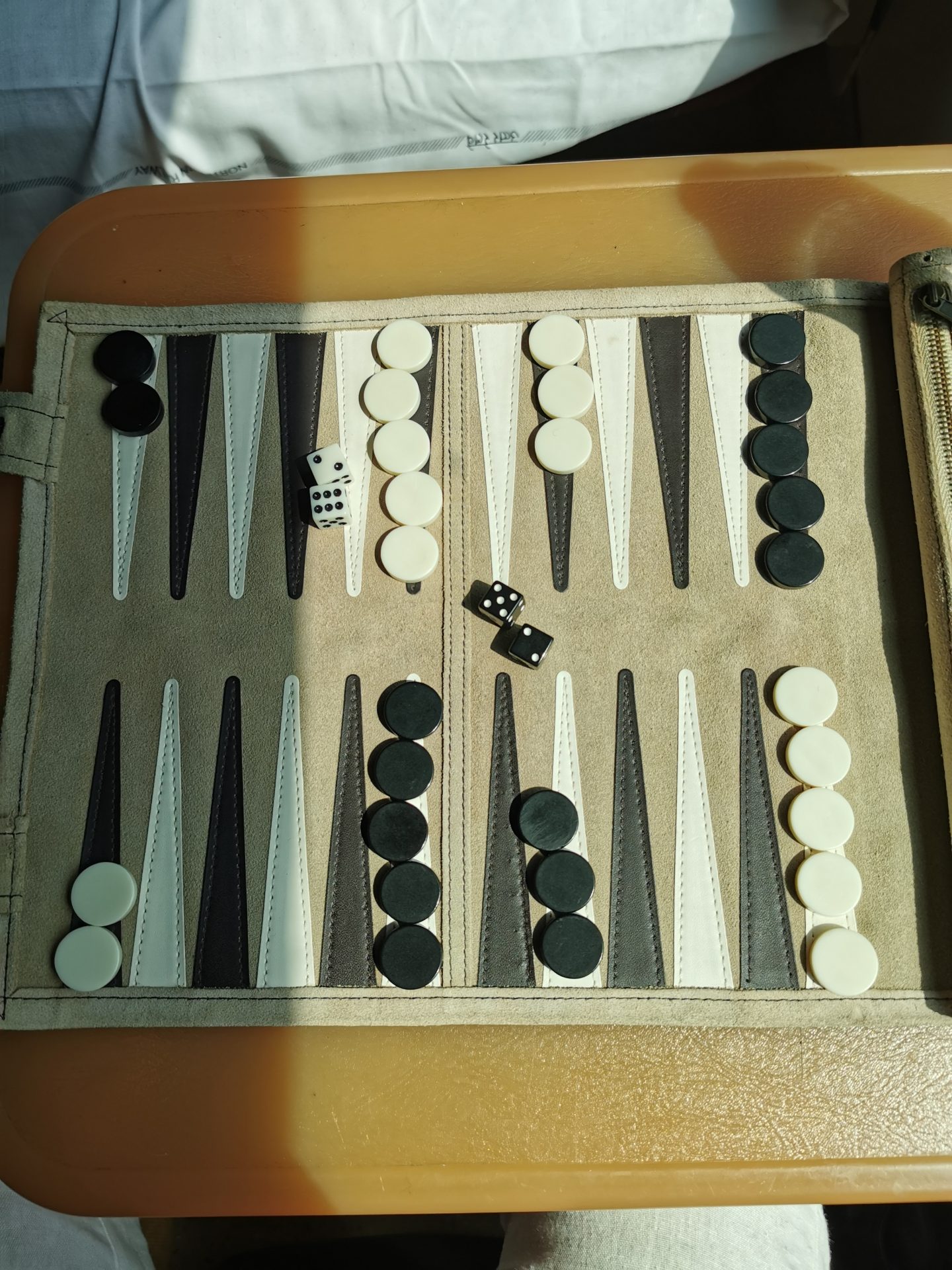
Back at Bamboo Lagoon in Alleppey we’re greeted with a big smile by the sinewy ferryman. Across the canal is the young jovial hotel porter. ‘We have your favourite room ready for you.’ he says. With such a welcome we feel like we’ve really arrived. It’s a small irritation that our first night’s sleep is spoiled by a noisy malfunctioning air conditioning unit in the room below, but it’s a decent compensation when, for our last few nights, we’re upgraded to a grand villa room on the canal front..
These five days in Alleppey conclude three weeks of relaxation and recovery from the rigours of travel in India compounded, for me, by Covid. It’s now very hot throughout the day and we spend hours reading and writing by the pool with fruit and cold drinks, the procurement of which is mildly challenging and amusing in an Indian fashion. I go to the restaurant where there’s a waiter I’ve not seen before. I actually found him in the kitchen so he’s probably a chef. ‘Hi. We are by the pool. Can I order some drinks?’ ‘Sure. We only have beer.’ ‘That’s excellent. I’ll have a beer. Don’t you have any fresh fruit juices?’’ ‘Yes. We have watermelon and pineapple.’ ‘OK. I’ll have watermelon. No sugar. Do you have Pepsi?’ ‘Yes we do.’ OK. Then I’ll have Pepsi with ice, watermelon and a beer.’ The waiter goes away but soon returns. ‘We have no beer.’ The drinks arrive but no ice.
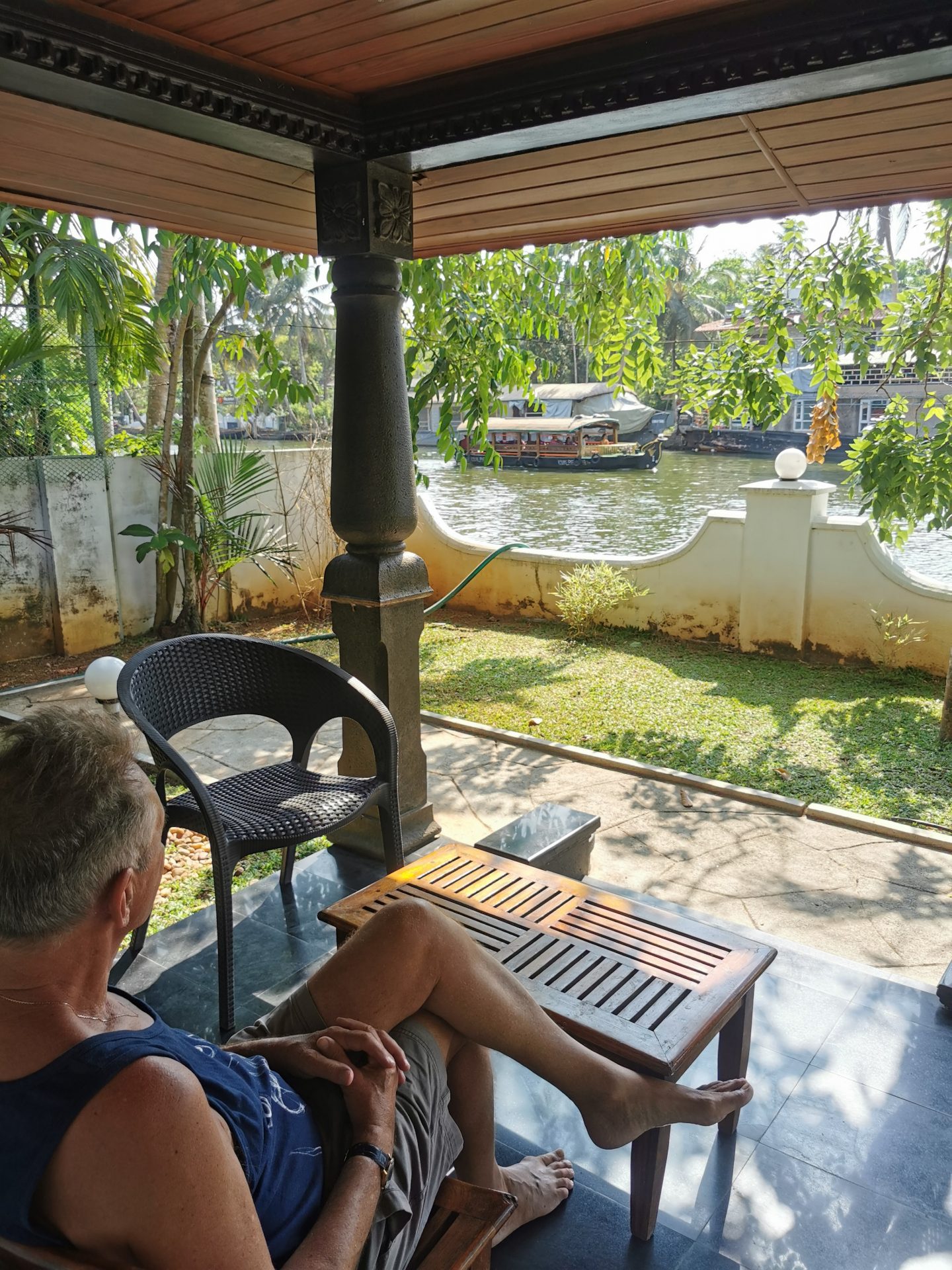
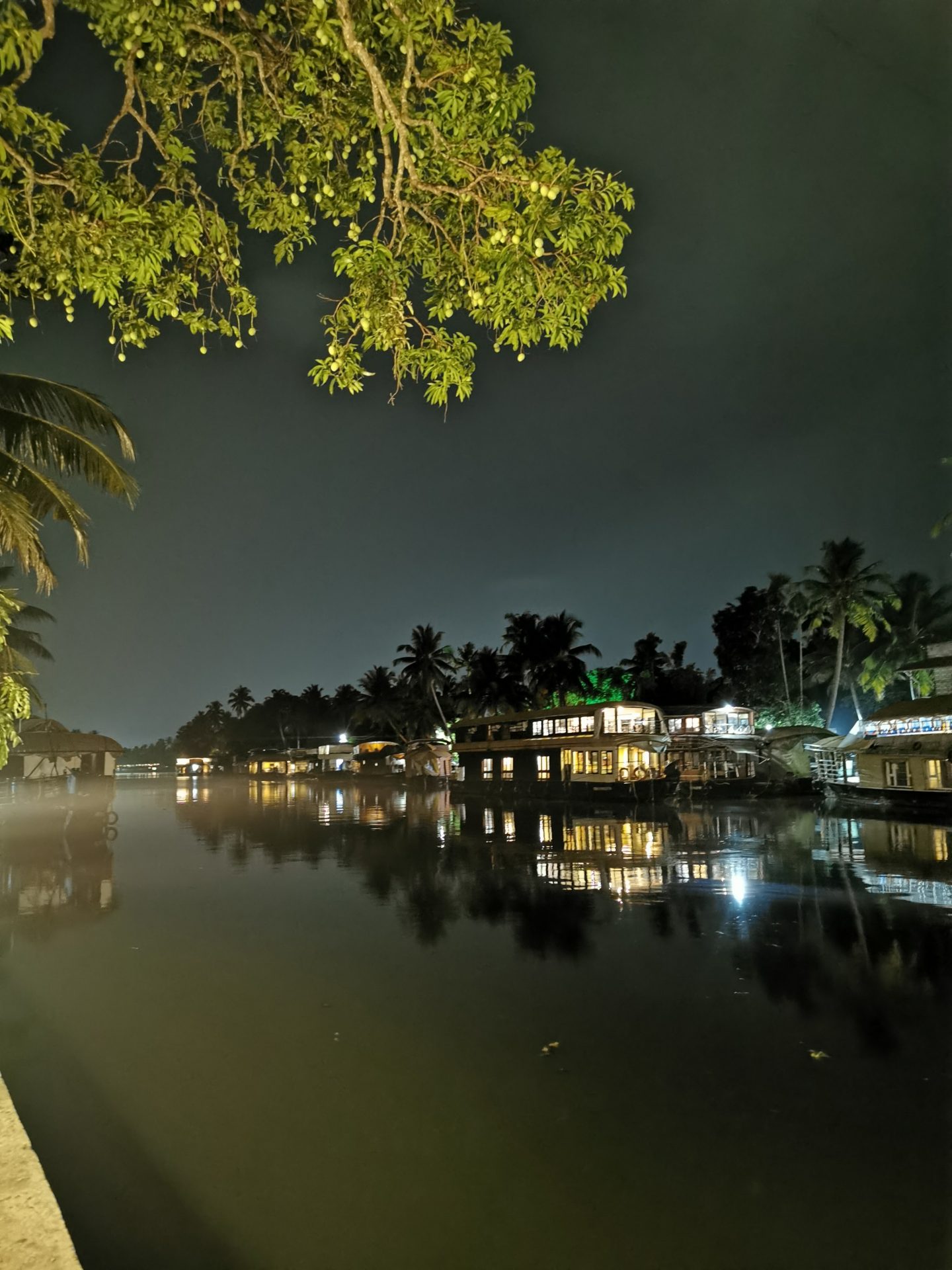
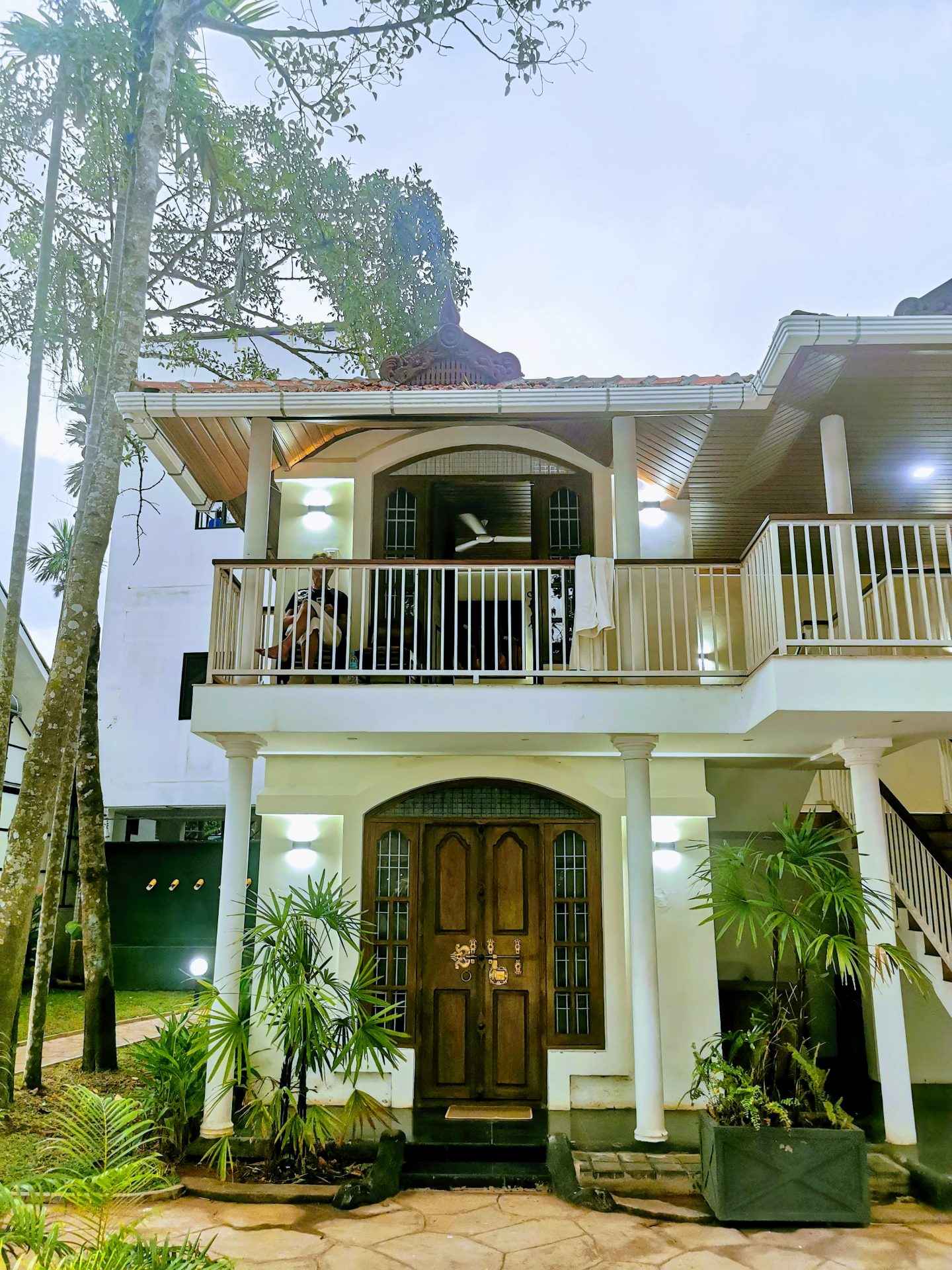
We’re on the last leg of our journey, a relatively short train ride to Trivandrum. Our train is predicted to be two and a half hours late and it’s very hot on the station platform. There are a few slowly revolving ceiling fans and there’s an empty bench beneath one. But there’s a dog asleep in front of it and I’m reluctant to disturb him. We met a young Yorkshire lad staying at Bamboo Lagoon and he told us the story of being recently bitten by an innocuous looking mutt that quietly walked up behind him and bit his calf – no yapping, growling or barking. The lad needed a series of anti rabies jabs costing him 60p. I’m of a mind to let this sleeping dog lie. After an hour I take a walk down the platform to stretch my legs. There’s a big rat sniffing around a bin. I loudly clap my hands and the rat is startled. I walk closer and clap my hands again, startling him again. I’m now fifteen metres away and can see that he’s a foul specimen with an oozing red sore on his side. I clap very loudly. The rat turns and runs at me. I run too, but faster.
On the wall of the station master’s office is a plaque which reads ‘Southern Railway. Alleppey – Kayankulam. Broad Gauge Railway Line Construction Inaugurated By Shri. Rajiv Gandhi. Prime Minister of India on 17th January 1987.’ Rajiv Gandhi became Prime Minister of India in 1984 after the assassination of his mother, then Prime Minister Indira Gandhi, to become the youngest Indian Prime minister at the age of 40. Tragically he was also assassinated, in 1991, by a female suicide bomber from the Sri Lankan militant organisation, the Tamil Tigers. Despite the not unusual allegations of financial corruption in Indian politics, today he is remembered as a great son of India, a man that modernised the country, setting it on the track to become one of the biggest economies on earth.
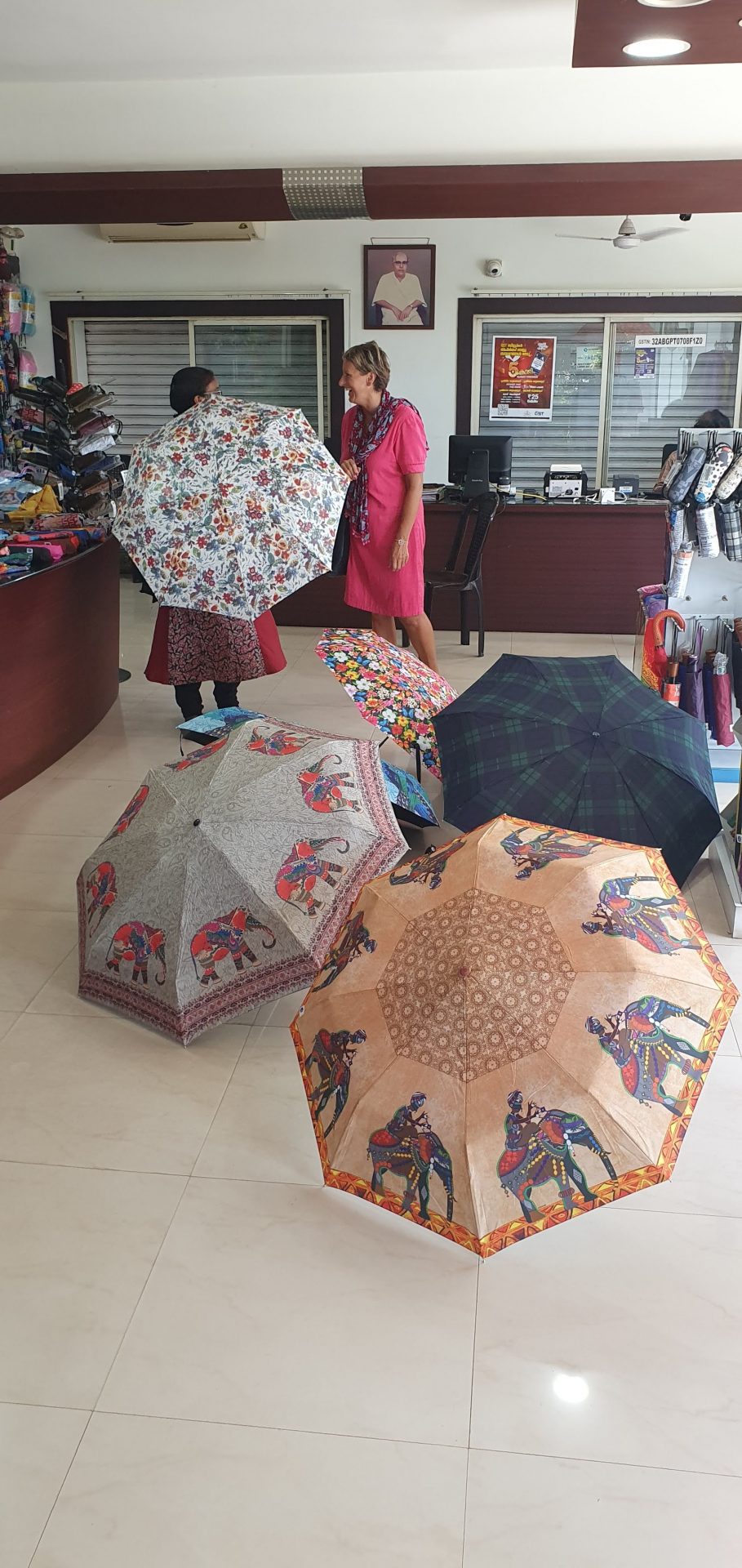
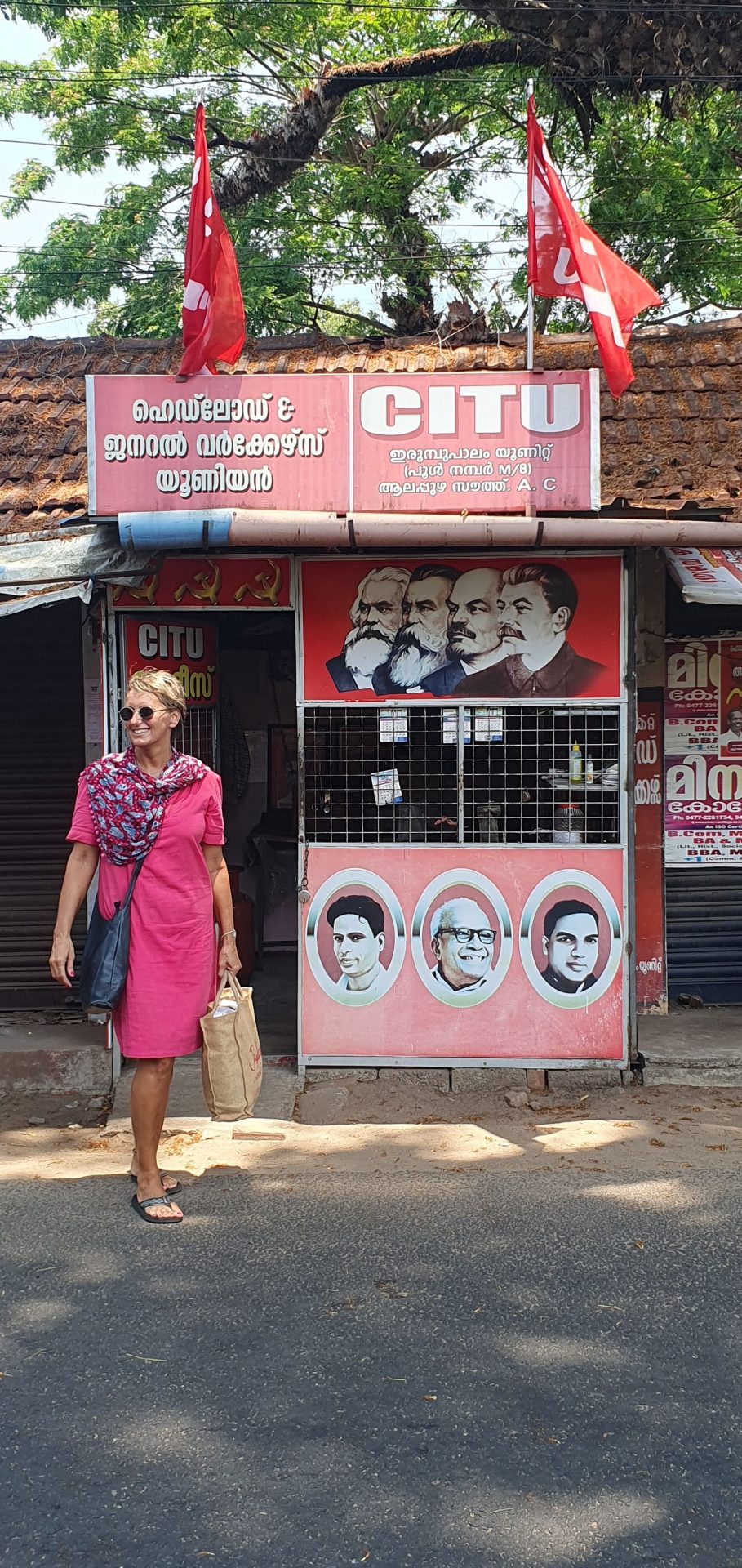
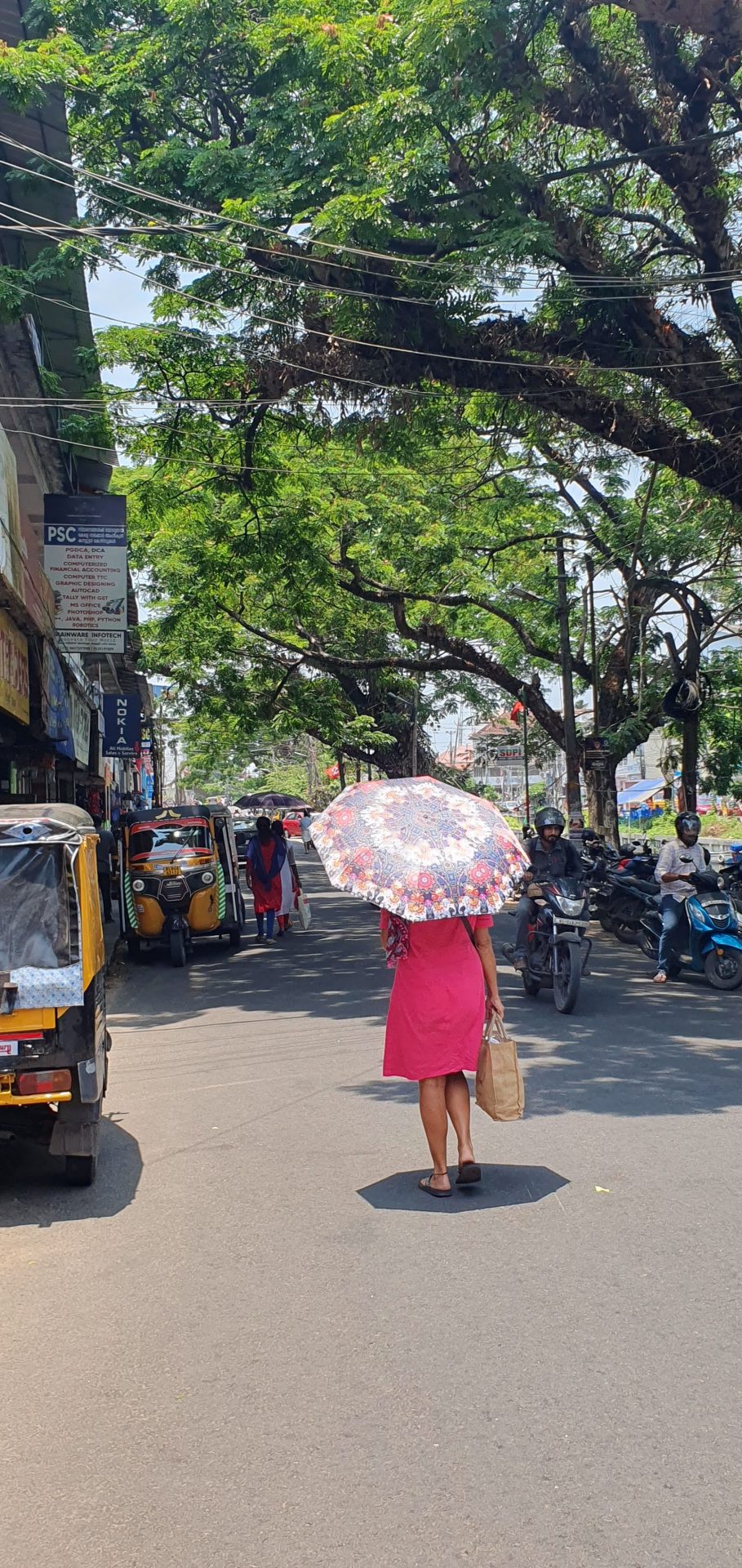
We’re back where we started at Santa Maria Boutique Hotel by the beach in Trivandrum. We’re here for just one night and the day tomorrow before our overnight flight to Dubai. We walk the fishing beach and watch a group of thirty men haul a net out of the ocean. A couple of months ago we watched as they caught nothing. Today they have more luck – not much – there are perhaps a dozen fish in their catch. We drink tea at the Coffee House restaurant on the beach and buy a couple of toys for the children of our hosts.
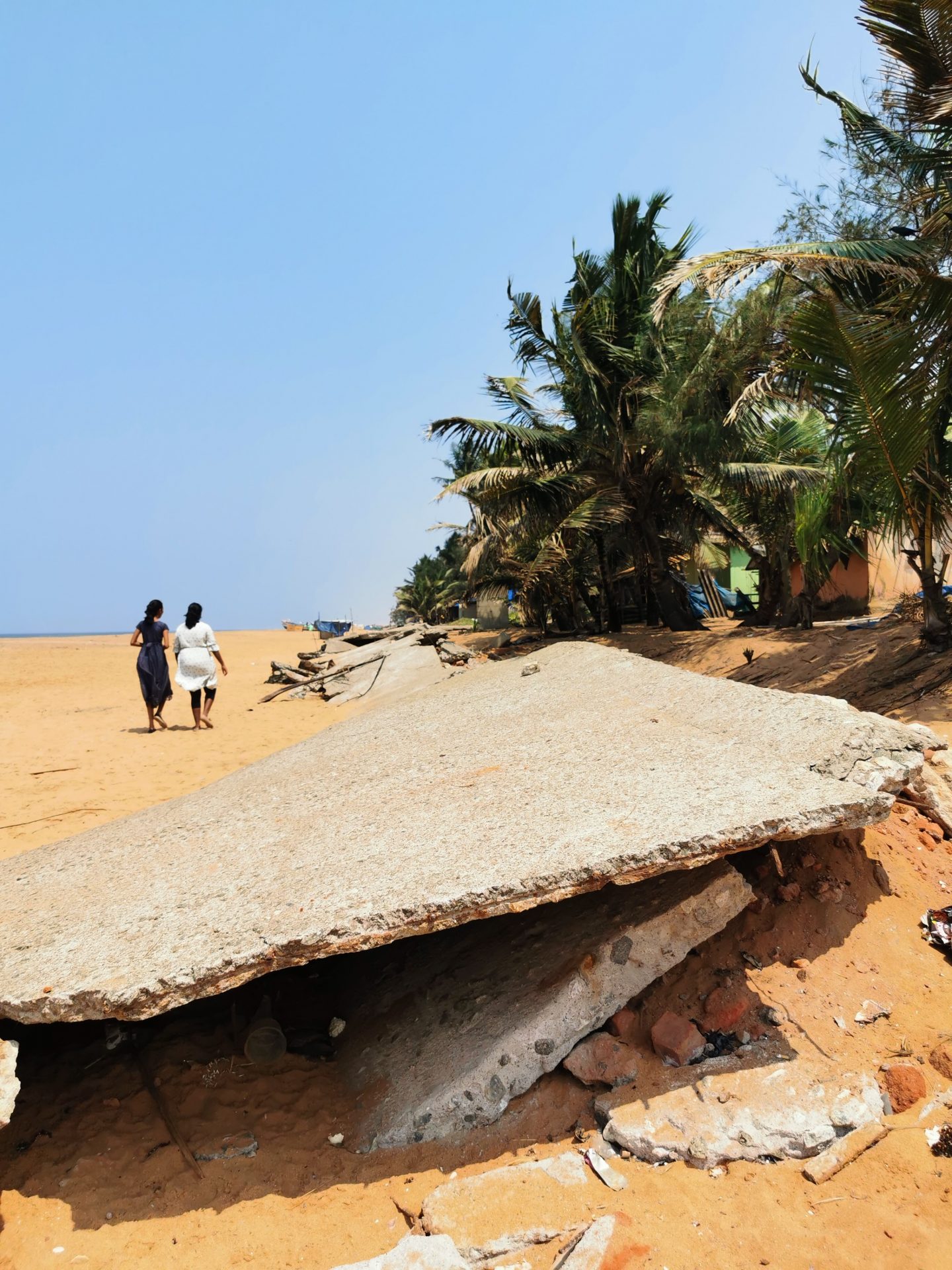
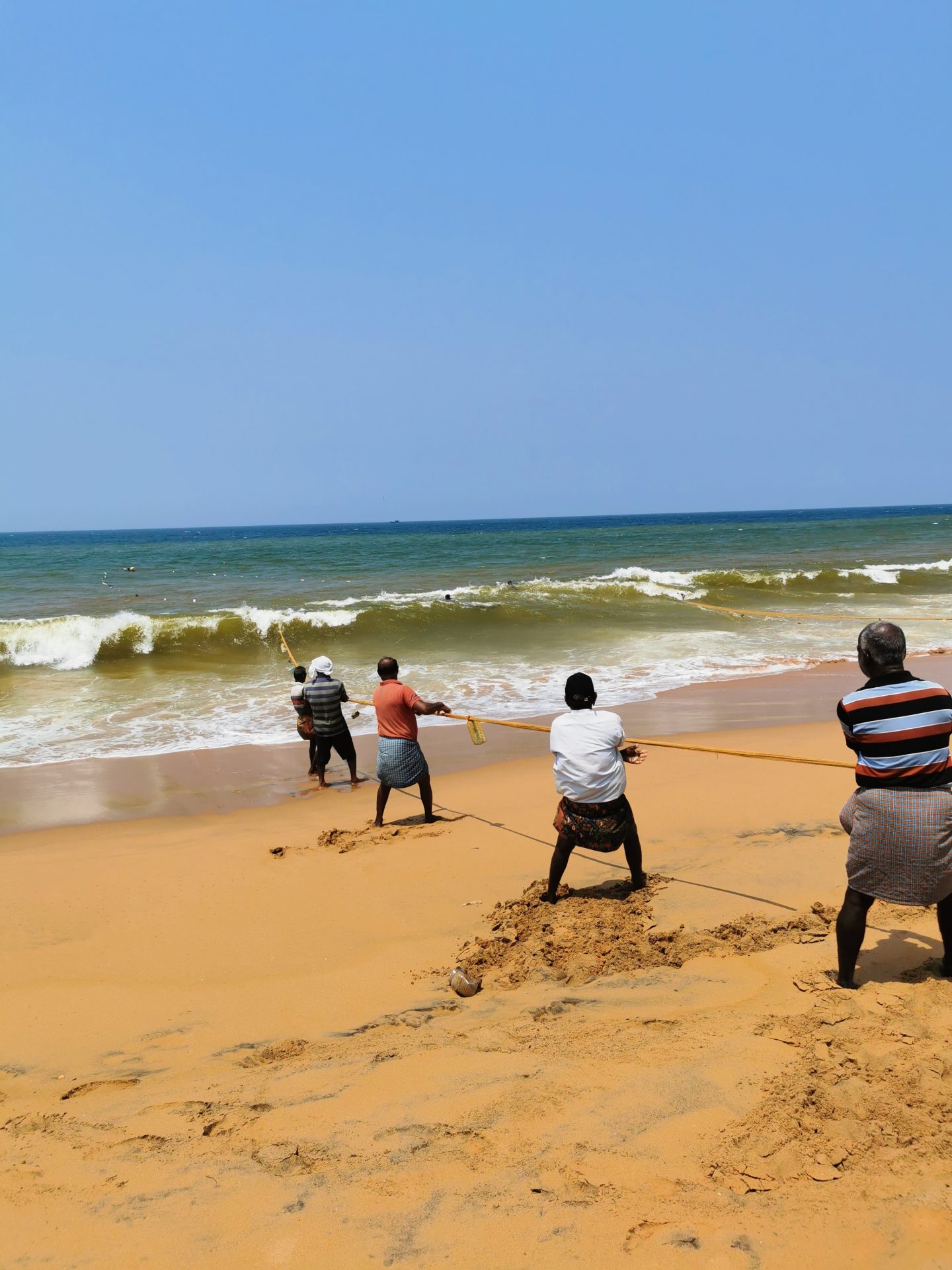
We’ve had a few encounters with Bollywood on our trip. In Mananthavady, Jo went for a solo walk and met a young couple of Bollywood actors from Mumbai on their honeymoon. She had a long conversation with them over ice creams and coconut juice. On a rickshaw ride in Chikmagalur we were flagged down and asked to wait whilst a film scene ahead of us was shot involving a handsome bearded Indian guy on a Royal Enfield motorbike with a beautiful woman pillion rider. We stopped for a chat and took a few photographs.They were as delightfully interested in us as we were in them. We also saw scenes being filmed on mountain summits and beaches. In Bamboo Lagoon, we were entertained by the young waiters in the restaurant who often played Youtube videos of extravagant Bollywood dance scenes. We have a free day today and Jo is keen to visit a fleapit cinema showing a fun Bollywood movie with big dance routines and lots of audience participation so I check out the local cinema listings, but there’s nothing that fits the bill. However, there’s an IMAX cinema in town showing Keannu Reeves in the fourth film of the John Wicks series; Chapter 4. This is my first experience of an IMAX and cinematographically this film does it justice. It’s also a not so gentle reintroduction to western culture. In his first scene, the gravitas of a world weary Reeves draws cheers and applause from the audience. Chapter 4 is 80% martial arts fight scenes and gunfights with a wonderfully absurd Wacky Races car chase in central Paris. At almost three hours it’s a challenge but the cinema is fabulous.
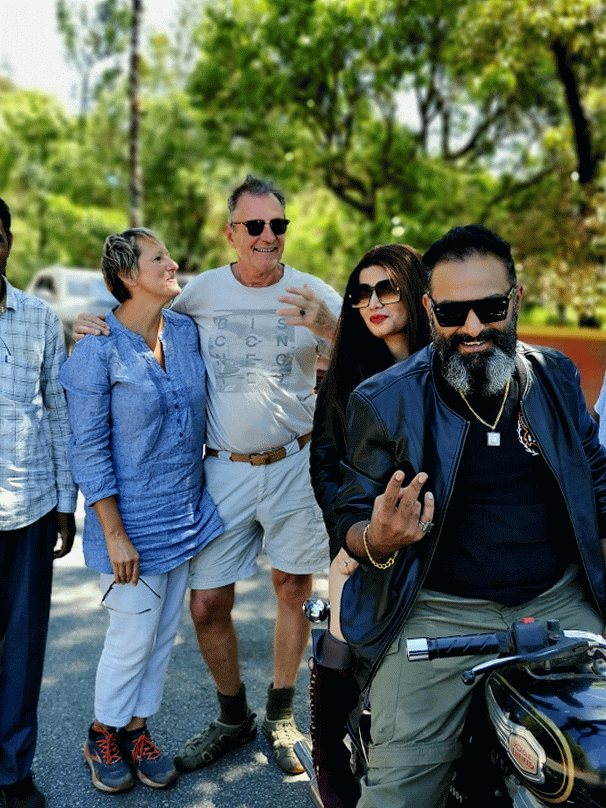
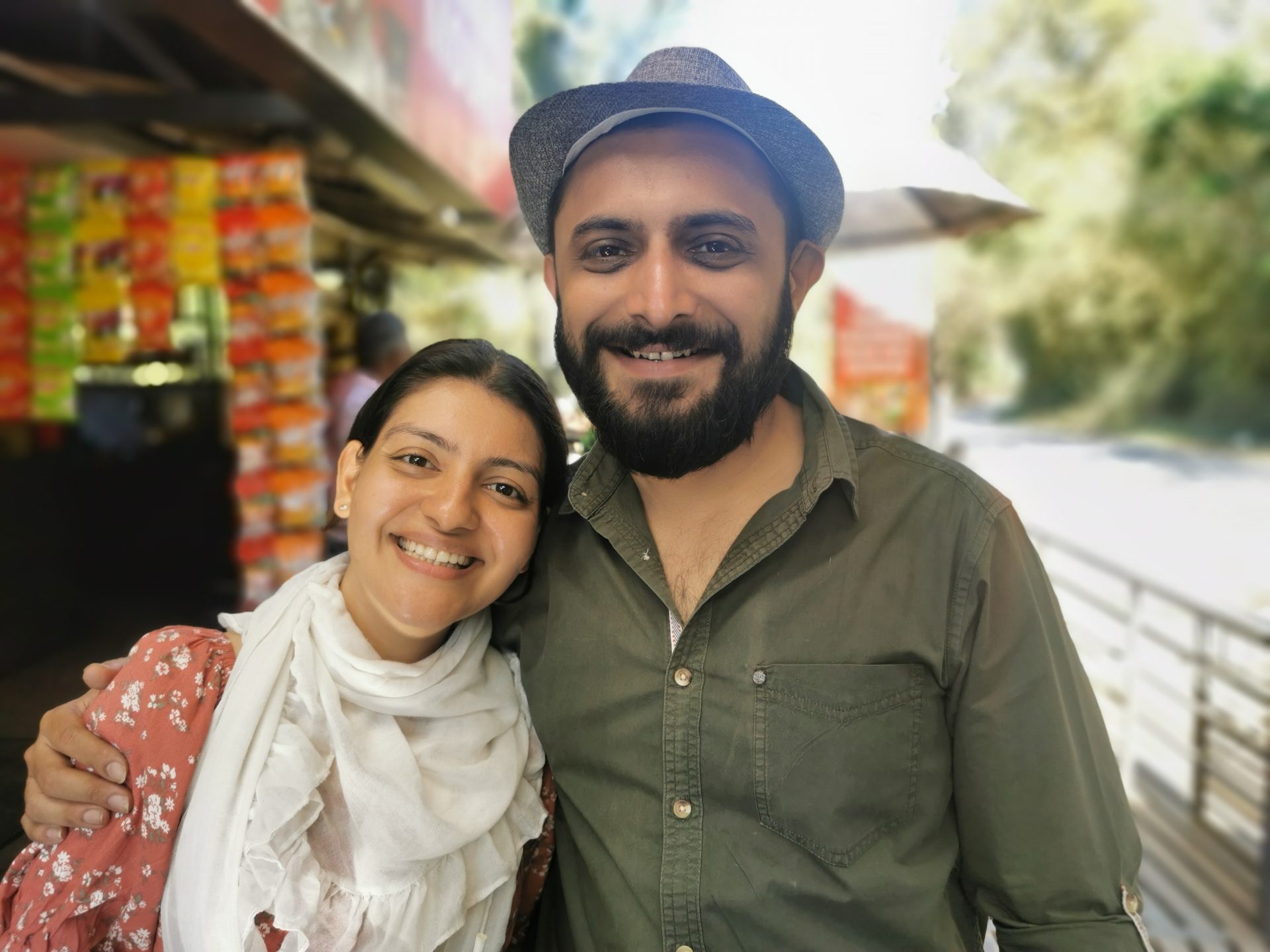
It’s a long journey home. We have an eight hour stopover in Dubai and I have some time to reflect on our time in India. I was last here 35 years ago. In a world of dramatic transformations so little has changed; the poverty, the deformities of the poor, the smells of incense and wood smoke, spices, fumes, dust and decay, the weight of numbers, the endless inescapable noise. It’s all a confusing paradox, one’s senses and emotions simultaneously offended and delighted. But in the end the strongest reminder and lasting impression is of the resilience, spirit, kindness and humour of the Indian people. The hand of friendship, the smiles, the laughter and the ever present namaste
